Text
Colossal: The Kaiju Honey-Trap to Lure in Misogynists

**WARNING: SPOILERS AHEAD**
When I walked into the theater to watch Colossal I thought I knew what I was getting into: the film had set up its audience for a fun mash-up between a kaiju film and an indie romcom. Anne Hathaway plays Gloria, a thirty something screw up trying to make it in NYC. She drinks too much, parties too hard, and just does not have her sh** together. The story starts when her uptight British boyfriend can’t take her shenanigans anymore so he breaks up with her and kicks her out. Gloria returns to her hometown where who should she run into but childhood friend and Resident Nice Guy, Oscar (played by Jason Sudeikis). Maybe with the help of his down-to-earth charm and small-town thoughtfulness Gloria will experience some good, old emotional growth. Just look at that budding romance:
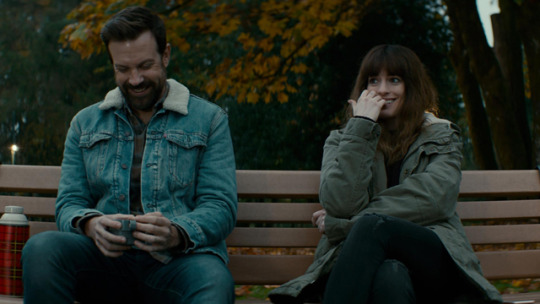
Oh, and Gloria also discovers that she is somehow connected to a giant, even colossal, monster that mysteriously appeared in Seoul, South Korea that nicely sets up all sorts of metaphors about inner demons and alcoholism and the external consequences of our actions, and whatever, that’s not what this essay is about. But minus the giant monster, we’ve all seen this movie, right?
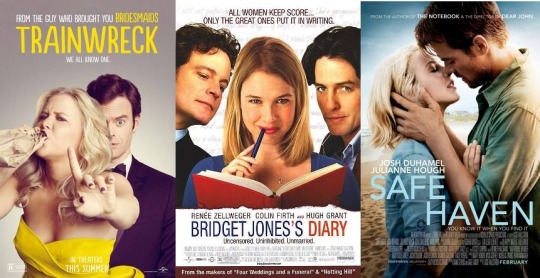
Spoiler alert: Wrong.
When Oscar drives into Gloria’s life in his red pickup truck, he is everything you’d expect from a small-town nice guy. Laid back, friendly, helpful, and the antithesis of her ex-boyfriend Tim (played by Dan Stevens) who was uptight, British, and hyper-critical. Oscar in contrast doesn’t judge Gloria’s behavior but unobtrusively tries to help her. He gives her a job at his bar and introduces her to his friends. He even gives her a TV and a futon. We learn that he has long-lasting feelings for Gloria dating back to their childhood, but he doesn’t push it because he’s a “nice guy.”
Enter the Robot.
Oscar emerges from the wings in which he’s been perpetually waiting for Gloria to come back and fall for him with a colossal counterpart of his own.
What’s going to happen next? What evil will emerge for the two of them to join together and fight? What life lessons will our protagonists learn about themselves?
In short: Oscar is going to metaphorically chain Gloria to him because the evil that emerges is domestic violence and the only lesson they’ll learn is that a guy doesn’t have to be a rich, megalomaniac to be an abuser (although that certainly doesn’t inhibit - for more details see the current US president), abusive a**hole potential can just as easily be found in the boring, average, nice guys.

One could try to argue that his giant robot avatar sets him apart from most guys, but that isn’t what makes him a bad guy. His ability to control a giant robot in Seoul only enables him to exert power and control over Gloria, it doesn’t create that desire; that is all him. Speaking of power and control, I think it’s time to direct our attention to the Power and Control Wheel:

Oscar manages to use most of these tactics over the course of the film. The first red flag the audience saw that the Resident Nice Guy wasn’t so nice was when he got unjustifiably jealous over his cute friend. He used the fact that she slept with his friend to justify his mean and controlling behavior. As if they had made some silent agreement that his niceness and generosity were contingent on the fact that they would eventually enter into a romantic relationship. A silent, imaginary agreement that she violated and therefore deserved to be treated like garbage. By giving her a job and furniture he is able to control her economically and make her feel that she is somehow in his debt. When Gloria tried to call him out on his behavior, rather than owning up to it, he deployed some armor-piercing emotional abuse and minimized his behavior by comparing it to the time that she fell, accidentally killing hundreds of people. Finally, he threatened the people of Seoul to blackmail her into staying much like real-life abusers use children and loved ones.
Now because we didn’t know that we were in a domestic violence movie, most of us probably overlooked or were quick to forgive all of these microaggressions. The fact that he had been keeping tabs on her ever since she left was sweet, not obsessive. The fact that he repeatedly watched her get drunk to the point of memory loss was just him letting her make her own choices (unlike that hyper-critical Tim); he wasn’t purposefully getting her drunk so that he could more easily manipulate her. The fact that he freaked out at Joel when he tried to kiss her wasn’t possessive it was protective.

It's only with hindsight and context that the audience can reinterpret Oscar’s actions as controlling.
Even after Oscar goes full, evil villain and threatens to destroy a town, Gloria (and probably a lot of people in the audience) still treat him like the Resident Nice Guy. Oscar isn't set up as the domestic abuser like in the movies Enough and Sleeping with the Enemy. Those abusers are shown very early to be basically pure evil. Oscar isn't like that. While none of his actions are excusable, it is possible to come up with excuses and explanations for his behavior. He only acts like that when he's drunk, he feels trapped in a small town, he never lived up to his potential, he's trying to hold on to a childhood sweetheart. None of those excuses are valid, but they are very typical. Everyone knows someone who gets unreasonable when they're drunk, who's bitter about their lot in life, and occasionally takes it out on others. So when he apologizes so sincerely, Gloria’s willingness to let it go and to blame his behavior on how drunk he was is understandable. And for like, five minutes, Oscar goes back to being a nice guy, but as soon as things stop going his way again, he reverts right back into his controlling, demeaning tactics towards her.
Which is when I direct attention to the Cycle of Violence.
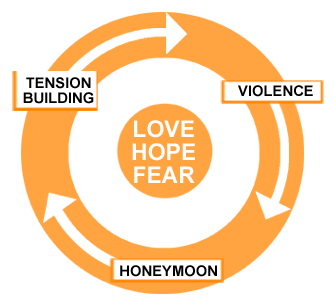
The film shows its audience two full cycles of violence. This is critical because it is the only way to show that Oscar’s recent behavior isn't an aberration. His apologies, promises, and pleas that he makes at the end of the film cannot be trusted because he has broken those promises before (it helps that literally hundreds of lives are at stake in Seoul). But that moment of hesitation when her avatar monster has Oscar in her clutches is incredibly tense. I for one, didn’t know if she was going to let him go or flick his head right off like a quarter. Ultimately, what justifies her actions is that knowledge in the back of the audience’s head is that he cannot be trusted to keep his word. Because he didn’t before. By taking the time to show two full cycles, the film rejects the idea of a linear devolution from Nice Guy to Piece of Garbage and instead shows that Oscar is actually both...and neither, it depends on where he is in his cycle (menstrual pun intended).
Oscar is so average, he isn’t even the only average a**hole in the film; there are two more. Tim has two major jerk moments, one at the beginning and one when he pretends to be on a business trip to see her again. After that first scene, I really didn’t think we’d see him again. When he showed up again halfway through I was surprised and a little disappointed. Really? The uptight ex really loved her all along and he’s going to swoop in and save her from her nightmare? But Colossal subverted my expectations again. First, they didn’t paint his lying about a business trip and flying all the way out there as cute, they painted it as what it truly would be: weird and disconcerting. Second, the film also showed how equally unromantic and sexist and gross it is for two men to compete with each other for a woman without consulting her at all.
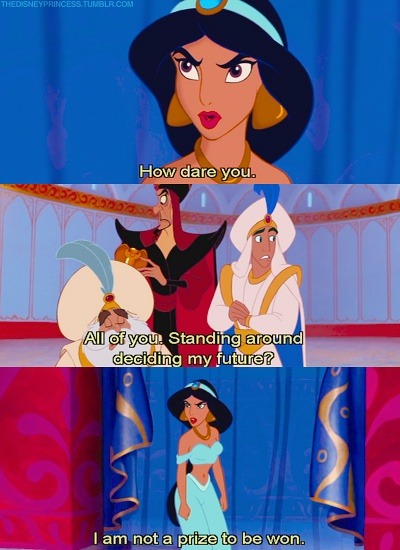
Third, they showed that Tim too had his place on the Power and Control Wheel. He regularly used emotionally abusive tactics to make Gloria feel worthless. He proved that he wasn’t there to help her, but to wear her down with criticisms until she fit his expectations.
Then there’s Joel. Joel is not abusive. He seems like a nice guy, but you know what else he is? Frakking useless. He knows Oscar, has known him for years, he witnesses Oscar’s behavior, sees how vile it is, and does NOTHING. He doesn’t call Oscar out when he mistreats Gloria, and he doesn’t call him out when he’s laying waste to entire neighborhoods. He doesn’t even comfort Gloria, show her any support, a single pat on the shoulder. This is his chance to punch a robot...(once removed)! Be a hero! Instead, the only thing he does is give a tiny little thanks-for-nothing smile while he watches Gloria take care of her own self from the warm safety of a bar.

I’m not saying that by not interfering Noel is “just as bad” as Oscar, what I am going to say is that by not calling Oscar out, he’s perpetuating the idea that what Oscar’s doing and the way he’s treating Gloria is no big deal.
Really the only halfway decent guy the film has in it is the drug addict. He does make some feeble attempts to hold Oscar accountable for his garbage behavior. But once he starts taking on some of the heat himself he’s quick to jet. Gloria is utterly alone. Surrounded by run-of-the-mill jerks who are all part of the problem. The problem being a culture that equates jealousy and obsession with romance, aggression with assertiveness, and demands bros before hoes.
When viewed in that context, the actions of Oscar, Tim, and Joel are no longer so surprising. Oscar wasn’t in a lab accident that turned him into an evil psychopath, he wasn’t secretly an evil psychopath the whole time, he’s just a run-of-the-mill jerk.
He’s the guy who insults you when you try to give him a criticism, the guy who thinks because he bought you dinner so many times that he’s definitely going to get some, the guy who gets jealous of how much time you spend with your friends, the guy who thinks you should be grateful that he didn’t make out with your roommate when he had the chance, the guy who tells you to not be such a b*tch. What makes Oscar a compelling villain is that he isn’t compelling at all: he’s the Jerk Everyman.

...and he need to be stopped.
5 notes
·
View notes
Text
Naked Power! The Power Dynamic of Nudity in Game of Thrones

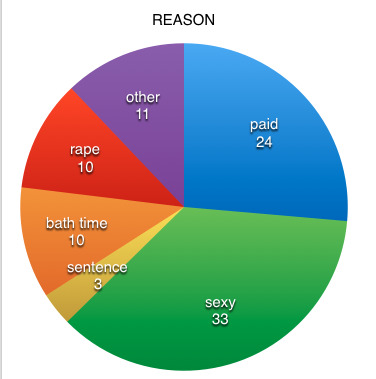
In honor of the new season, I want to talk about Game of Thrones. And all I’m going to focus on is the nakedness.

I find the whole concept of nudity fascinating. And Game of Thrones has a lot of it to fascinate. And by a lot I mean ninety-one instances. How do I know that? I made a spreadsheet!

What first becomes apparent is that there are significantly more naked women than naked men.
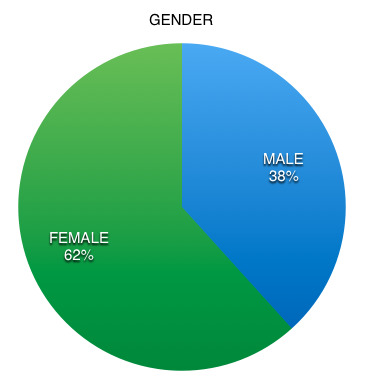
This comes as no surprise and has been talked about all over the internet. But now we have actual numbers to back it up: in all 50 episodes, there are only 6 wangs to the 21 whohas.
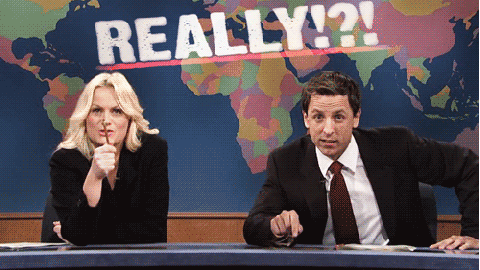
Now to be fair, I have come up with a legitimate reason for not showing a penis in a scripted show. Those of you with delicate sensitivities, prepare your smelling salts.

According to the data, 62 percent of the nudity in Game of Thrones happens during sexy time (whether it’s love-making sexy time, paid sexy time, or everything in between).

A penis has to look a particular way during sexy time, and if the the actors’ penises looked like that, we would no longer be watching a fantasy show with mature content, we’d be watching porn. I’m not judging the porn industry, it’s just a different thing. But that is one logical reason for hiding the dong. Adjusting the camera placement is much simpler than creating some sort of prosthetic…computer generated erection or something.
Another, less forgivable argument to explain how much female nudity there is in the show is the fact that a lot of the nude characters are prostitutes. It’s what I would argue is the show’s biggest weakness when it comes to its portrayal of women. Pretty much all of the named female characters are strong, complex, and fully-fleshed (no pun intended): Cersei, Margaery, Arya, Brienne, the awesome Mother of Dragons who we’ll get to later…the list goes on. But while unnamed male characters are likely to be soldiers, I would guess (I don’t actually have the numbers for this, making a spreadsheet of every unnamed character on Game of Thrones is beyond my skills), that unnamed female characters are about 3 to 1 prostitutes. And it’s pretty frustrating to see such blatant sexual objectification in a show that is obviously capable of writing women as subjects.
But I digress, this is supposed to be about nudity! What I love about nudity is the power dynamic that it creates. Often nudity is used as a way of shaming someone, making them more vulnerable. We see this when Joffrey is toying with Sansa at court and when Daenerys is forced to have sex with Khal Drogo for the first time. By having Drogo forcibly remove her clothes, in the same way that Viserys had removed them earlier in that episode, the show is able to use nudity to convey how powerless Daenerys is; she has no control over her own body. The next sex scene between Drogo and Daenerys is also completely non-consensual, and her breasts are once again completely visible to the audience. In contrast, Drogo is naked but the nudity is never explicitly shown. He still has the power. But the next time they have sex, Daenerys is attempting to take greater control in the relationship and the show conveys that in its use of nudity in the scene. Drogo’s rear end is shown as he enters the frame but she remains clothed the entire time. The power dynamic between the two of them has shifted in this scene and the use of nudity reflects that shift.
At times the show uses the shame and vulnerability nudity generates as an actual punishment, as a tool of “justice.” One of the first visible penises of the show belongs to the wine merchant who tried to poison Daenerys. As punishment for the crime, the Dothraki strip and drag him behind a horse until he dies. But we all know the biggest example of using nudity as punishment is Cersei’s Walk of Atonement.

To me, it is one of the most moving, difficult scenes of the series and Lena Headey does a masterful job. Cersei begins her walk fairly confidently. She’s going to do this thing, it’ll suck, but she can handle it. Cersei is one of those strong, indomitable characters with a superpower-level ability of looking down her nose at anyone and everyone. If anyone can handle this it’s her. But over the course of the ten minute scene the audience slowly sees her lose her composure. By stripping away her clothes, the church also strips away her rank and status, putting her below the peasants and she can’t handle the shame that accompanies it. And really, how could she? She has the entire city screaming hate and throwing literal shit on her, there’s a frigid nun chanting “shame” the whole time. Despite her best efforts to keep her composure, all of that hate and humiliation penetrates her emotional armor and she has nothing with which to shield herself.
Despite these scenes, the show does not generally use nudity to shame characters. According to my data, 25 percent of the time it is actually the nude character who has the power in a scene.
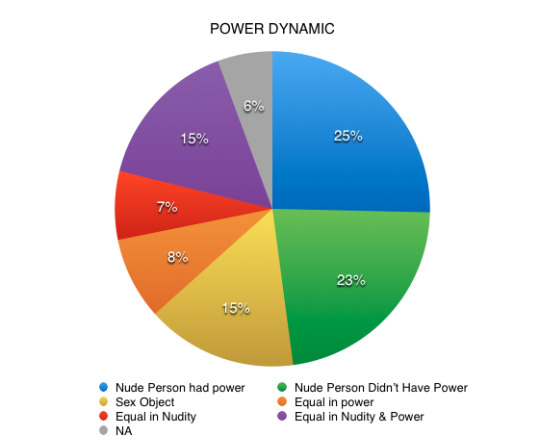
Sometimes a character comes along and transcends any attempts to shame and humiliate them. In a moment when they should be stripped of all power they manage to shift the power dynamic in their favor and make the witness, the clothed person turn away instead.
Case and point: Irene Adler.
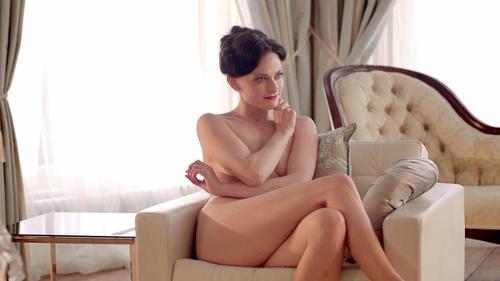
It is no longer the naked person’s job to cover themselves but instead it is the clothed person’s job to not look. Shame is suddenly in the eye of the beholder. Maybe it’s just because there’s so much nakedness so there are more opportunities for this to happen, but Game of Thrones showcases the complex, shifting power dynamic particularly well. One scene that particularly comes to mind is the bath scene between Brienne and Jamie. Jamie walks into the public bath, shamelessly baring everything, And Brienne is the uncomfortable one. She turns away from him. When he gets into the tub she is also occupying (which is supergross by the way. They’ve been traveling for ages, fighting bears and rapists and hiding in the dirt. Not to mention the fact that he had spent the previous weeks sitting in his own…fluids…as a prisoner of the Stark army. Why didn’t he just pour a cup of sweat and urine into her tub???), she tries to cover herself. But then as they start talking she claims the high ground and the authority of the scene by standing before him, just as naked and just as shameless as he was. Suddenly it’s his turn to look away.
For Melisandre, nudity is her favorite tool; she is naked all the time. While she typically uses nudity in a sexual way, seducing men to get what she wants, that doesn’t mean it’s not effective. She maintains the power and authority in any interaction simply by proudly revealing her objectively nice breasts. While she would probably say she gets her authority from the Lord of Light…come on. We all know it’s the nakedness which combines the shock factor, sex factor, and absolute refusal to feel any shame. Melisandre, more than any other character in the show, is never more powerful than when she’s naked. So regardless of how you feel about her as a human being, you’ve sort of got to respect that.
But it is Daenerys Stormborn of the House Targaryen, Queen of Awesome and the Fan Favorite, Khaleesi of the Bad Ass, Breaker of Patriarchies, and Mother of Freaking Dragons who really messes with the power dynamic of nudity. We already discussed how in the first season nudity was used as a way of showing her lack of control over her own life and body. But then she stands up in the ashes of Khal Drogo’s funeral pyre, totally naked and totally awesome.

It’s an “I am woman” power moment and from that moment on it doesn’t matter how naked Daenerys is, she has all the authority. She always, always has the authority. Unlike Melisandre, Daenerys doesn’t use nudity in a sexual way at all. The show is able to use nudity to instead showcase just how much power (both an inner power of confidence and self-assuredness and an outer one of armies/dragons/money) Daenerys has, so that even when she should be vulnerable, she isn’t.
Game of Thrones refuses to conform to one paradigm in its portrayal of nudity. It refuses to accept that nudity is synonymous with one thing, whether it’s vulnerability or humiliation or sexuality or empowerment. Rather, nudity is simply a tool that changes its purpose depending on who wields it. Perhaps this is simply a byproduct of its sheer volume of nude scenes. I mean, if you’re going to have an average of 3 nude scenes an episode you’re going to have to change things up every once in a while. However, this message gets undercut by the huge disparity between genders when it comes to graphic nudity. In the 11 scenes where the only real purpose of the nakedness was sexual objectification the naked characters were all women. So basically what I’m saying Game of Thrones is that I love your nuanced nudity and your refusal to dress it up (pun SO intended) as only a source of shame, humiliation or sexy time but instead acknowledge the role it plays in the power dynamic between characters. But you’ve got to stop with all the nameless prostitutes. Either that or somehow work into the plot a naked army or something, to balance out your numbers.
Anyway,
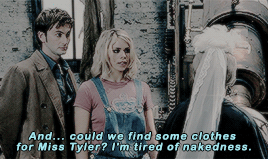
0 notes
Text
Sex Positivity is on the Rise! With the Help of the Adorable Film The Little Death
Before I get to my thoughts on my latest piece of fiction I want to set the stage with a brief history lesson on Sex and Culture. The path of sex positivity has not run smoothly forward in Western culture. Let’s start with the Elizabethan era: where the plays of Shakespeare are filled to the rafters with the bawdiest jokes and sexual themes:

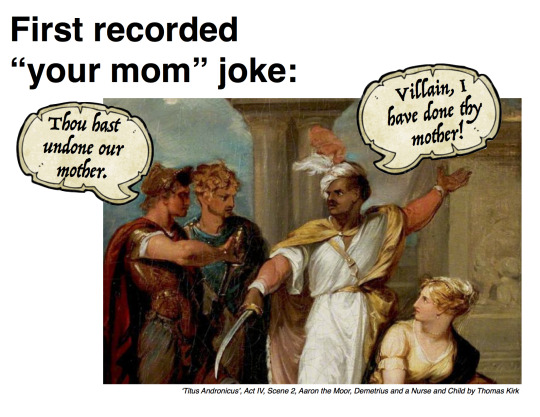
Then Victorian England comes along and everyone turns into shame-ridden prudes:
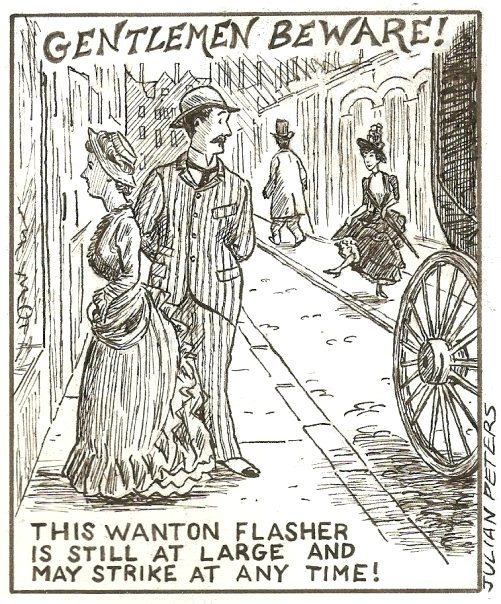
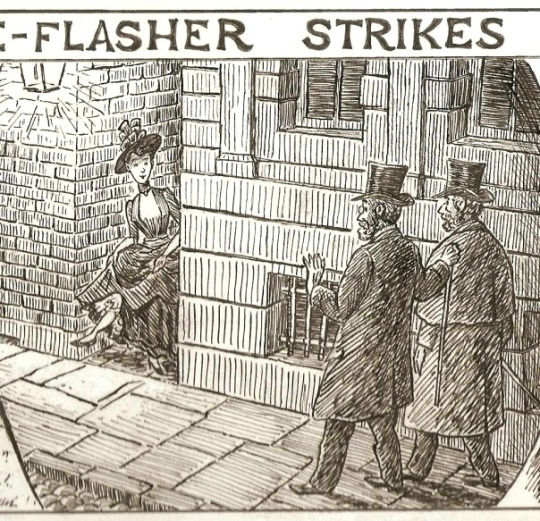
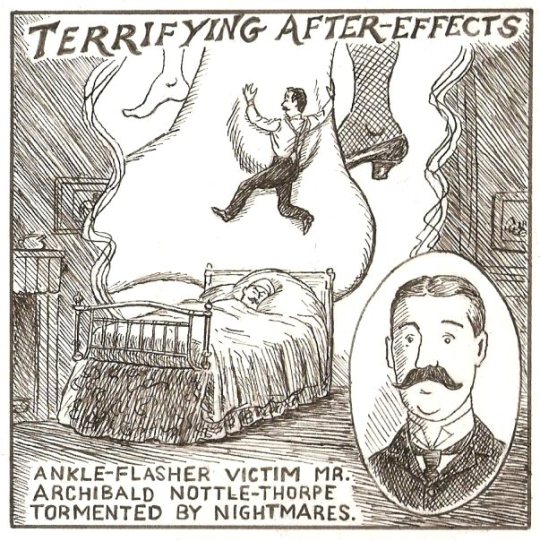
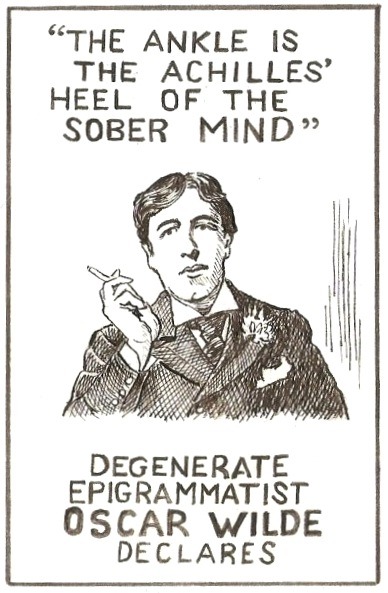
Until the 1920s when they become gender-bending skirt-raisers:
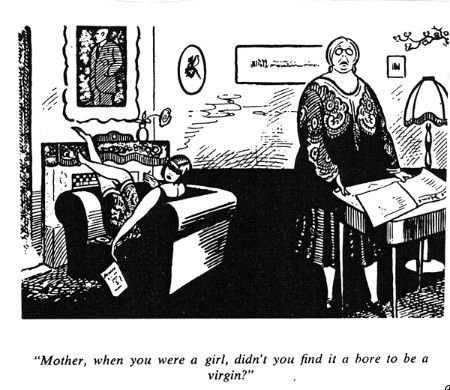
But don’t get comfortable because here come the repressed 1950s housewives and the Hollywood Hayes Production Code:

Then the 1960s Free Love Movement spits upon your code by creating the porn industry and throws birth control pills at your repressed housewives.
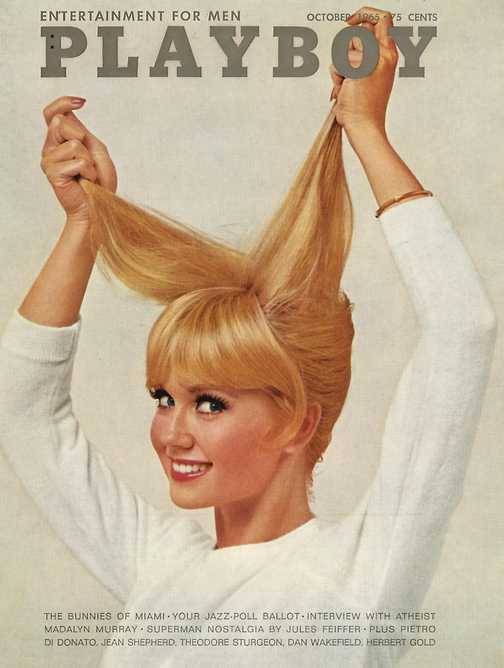

But then Reagan became president, the AIDs epidemic struck, and conservatism reigned.
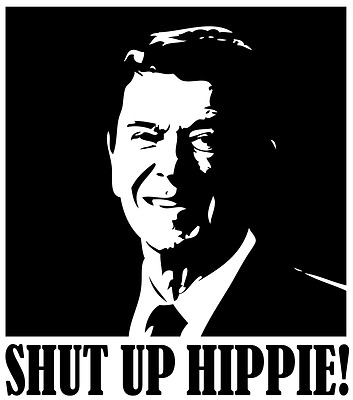
Today sex positivity is once again on the rise (did you see what I did there?), Huzzah! But before you start feeling too good about yourself, allow me to introduce you to an obscure little Australian film called The Little Death (and yes, they’re talking about that little death).
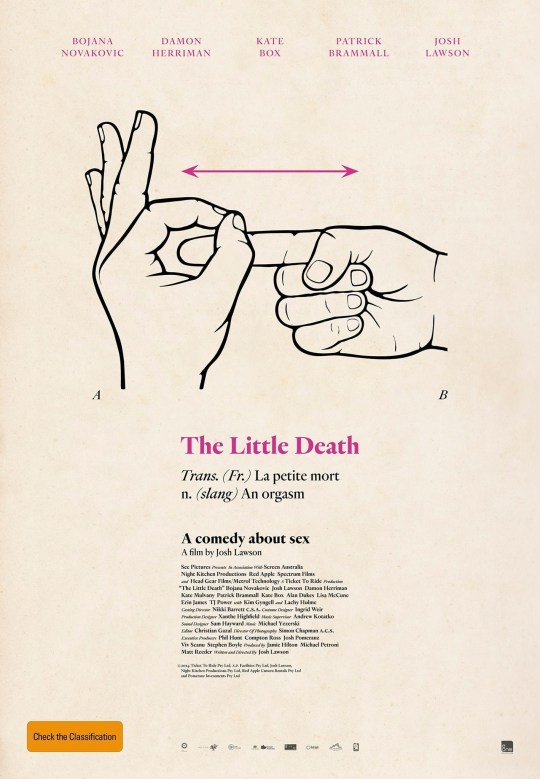
One of my favorite things that fiction can do is take the most marginalized and stigmatized groups of society and let us crawl inside their perspective and find all the complexity, love, obstacles, and humanity that exists in any other, more socially acceptable group. The Little Death is a film that does just that and so much more! It’s my new favorite thing (that’s what she said!) It looks at five fictional couples from a single suburban street who each reveal/discover a sexual fetish. Fetishists are people who, even in our growingly sex positive world, still get shunted into the closet, dehumanized and shamed.
Much like homosexuality 100 years ago (and, you know, yesterday for some people), the majority of society consider a fetish to be unnatural and if you have one then you have a psychological problem that should be dealt with and gotten rid of. By giving each fetish a human face, with all its complexity and its desire to love and be loved, The Little Death shows that the problem isn’t the fetish, but the extreme shame that society inflicts on those with one. That shame stops them from being honest and open with their partners and that is what creates problems.
Now usually I write about fairly popular things that I assume most people have read/watched/whatever. Since this film is so obscure I recommend stopping here and going to watch it before venturing forth if you want to avoid spoilers. It’s only 96 minutes!

The film opens with a closeup on a foot. A man’s face comes into the shot and it becomes immediately clear that he has…you guessed it: podophilia AKA a foot fetish. But it also becomes immediately clear that Phil has a relationship built on love, openness, and affection with his partner, Maeve. His fetish is clearly something they’ve discussed and incorporated into their sex life (along with some good ground rules like brushing his teeth before kissing her again). Their relationship gets truly tested when Maeve reveals her sexual fantasy: rape. Phil is at first shocked and unwilling, but in his desire to make Maeve happy, he begins to consider it. Phil and Maeve show how fetishes needn’t be a source of shame and judgement but can instead strengthen a relationship. Phil’s willingness to trust Maeve with his fetish, allowed her to trust him with hers. And furthermore, Maeve showed her love to Phil by her willingness to incorporate his love of feet into their sex life, which in turn gave him the opportunity to show his love to Maeve by trying so hard to fulfill her fantasy. Phil wins! Maeve wins! Love wins!
Contrasting the honest and open relationship of Phil and Maeve is Richard and Rowena. Rowena discovers quite by accident that she has dacryphilia: sexual pleasure in seeing someone cry. But when she makes this discovery she can’t bring herself to share it with her husband. Instead she goes to greater and greater lengths to manipulate him into crying. Some, like having onions for dinner every night, are relatively harmless but others, such as constantly bringing up his recently deceased dad and pretending their dog ran away, are seriously messed up.
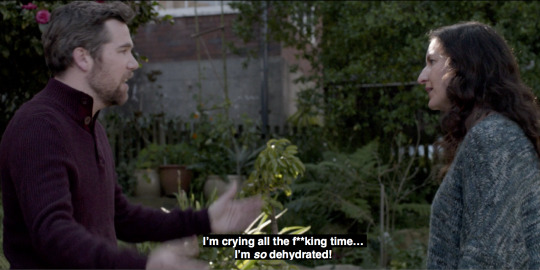
At one point she almost confesses to Richard. She tells him fearfully, “there’s something wrong with me…I’m sick, I’m so sick!” At that point the audience is able to see just how much shame and guilt she is harboring from her fetish. So much so that it destroys their relationship. That is the distinction that this show is able to make so effectively: that the fetish is not the problem, it is how the characters go about satisfying it that creates the contention. And shame forces characters to satisfy their sexual needs in subversive ways.
Phil would rather his wife Maureen think he's been having an affair than admit that he has somnophilia (sexual arousal from watching a person sleep). But while the previous relationships show that a fetish is not a psychological problem to be resolved, Phil shows that in some cases a fetish can result from deep-rooted marital issues. Phil is living inside a very unhappy marriage.

He cannot get any affection from his wife while she is awake, so he instead manufactures it while she is unconscious. However, I would argue that this isn’t actually a fetish. His actions are entirely romantic in nature: he buys her clothes, watches home movies with her, and cuddles with her. A fetish is, by definition, sexual in nature and he isn’t sexually aroused by watching his wife sleep; he’s...romantically aroused.
The same school of thought can be applied to Dan and Evie when their therapist recommends they experiment with role-play. Initially it seems to help. Evie clearly finds role-playing to be arousing, but for Dan it awakens psychological issues of self-loathing. Just like Phil, Dan doesn’t pretend to be someone else for sexual arousal, but for the psychological gratification of allowing him the opportunity to be someone else. In his own words: “Dan is boring. He’s pathetic. Why do you keep going on about Dan? I can be better than Dan, Evie. I’m done with Dan.” It’s a blurry line to be sure, the line between psychological and sexual gratification, but it’s very much there.
Finally, we have my favorite: Monica and Sam. Monica works at a call center that uses Skype in order to interpret phone calls for the Deaf.

Her job description is put to the test when a man with telephone scatalogia (sexual arousal from making obscene phone calls to strangers) asks her to act as his translator. This results in one of the funniest situational comedy scenes I have ever seen, and acts as an incredible metaphor for how communication is critical for any satisfying sex life, fetish or no fetish. Sam’s inability to communicate his desires created an impenetrable barrier (pun not intended but duly acknowledged) between him and a happy sex life. It took him the entire movie to work up the courage to overcome the shame for his fetish and ask for Monica’s help.
Monica in many ways represents the audience. And her journey probably mirrors your own. When she was first thrust (another unintentional pun) into the vast world of phone sex she is shocked and overwhelmed.

The whole thing makes her incredibly uncomfortable and she is fairly judgmental of Sam’s crass sexual choices. But then she opens her mind, finds a more accepting point of view, and manages to find the humor of the situation. Ultimately, she comes to see Sam not as a sexual deviant but as a cute, clever, interesting person whose desires, while different from hers, nevertheless deserve recognition and satisfaction rather than shame and judgement.
And with all that in mind, I leave you with the wise and neurotic words of Ned the Pie Maker:

0 notes
Text
Intimate Partner Violence with Super Powers AKA Why Everyone Needs to Watch Jessica Jones
It’s been over a week since I devoted 13 glorious hours to watching every episode of Jessica Jones. I have semi-returned to reality with a sweet, sweet Netflix hangover and several conclusions about the new show: first and foremost that David Tennant is amazing.
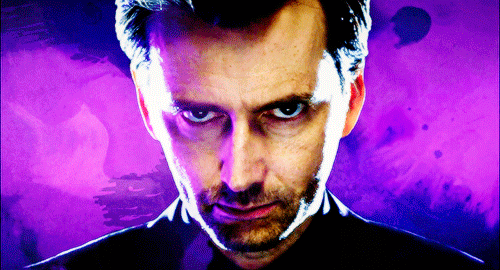
Second that this is science fiction at its very best. I’m going to let you in on a secret that only English majors seem to know: good science fiction isn’t about the science. One could also argue that it’s not even about the fiction. Rather, the science/technology/superhero element provides a backdrop to explore an aspect of humanity in a new way, a way that would be impossible if the story were strictly limited to the parameters of reality. Jessica Jones makes it particularly easy for its viewers to find the human element of the show by making it as realistic as possible. She doesn’t take on a superhero alter ego, refuses to wear a costume,
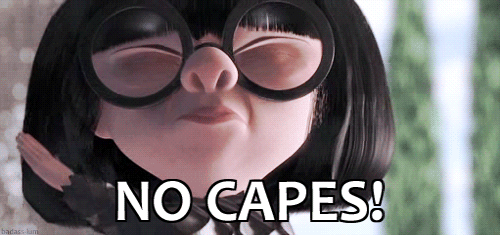
and while she does have a smallish heroic desire to help others, it’s buried beneath miles of snark and booze.
While the superhuman element of Jessica Jones is most definitely critical, the story that it’s actually telling is a human one: the story of intimate partner violence.
Now I know that at first it doesn’t seem this way. The relationship between Kilgrave and Jessica doesn’t look like your “typical” intimate partner violence situation. But as countless studies and experts will say, domestic violence isn’t just about physical abuse, it’s primarily about power and control. And Kilgrave’s superpower is to control everyone around him with a simple command (you see what I did there?).
Although, now that I think about it, Kilgrave’s superpower doesn’t make him all that different from a real life, run-of-the-mill abuser, just a more efficient one. The show even makes the effort to point out after Jessica almost punched him to death in her attempt to bait him that Kilgrave still has all the control even when he doesn’t use his power. The tactics that he uses in his attempt to control Jessica are right in the IPV abuser’s wheelhouse, kind of literally.
Below is the Physical and Sexual Violence Power and Control Wheel:
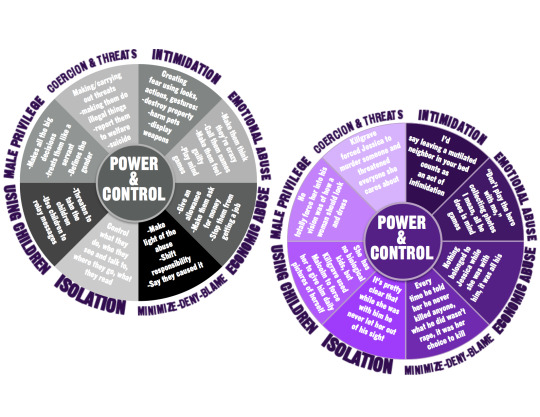
The left side contains examples from real life, while the right gives an example of how Kilgrave utilized the same tactic to exert his control over Jessica. There’s not a single one that doesn’t pop up at some point over the course of the series.
Furthermore, when Jessica agrees to live with him, viewers are able to see just how Kilgrave’s abuse fits into the cycle of violence that is present in most cases of intimate partner violence. Initially developed by Olga Botcharova, the cycle of violence is the term used to describe the typical pattern of abuse in situations of domestic and intimate partner violence.

Initially, Kilgrave is in full-blown honeymoon phase. I mean, the exact re-creation of Jessica’s childhood home is a slightly exorbitant gift, but he’s an exorbitant guy.

He’s romantic and apologetic and promises to never control her again.
And a small part of you is thinking, “well that’s kind of sweet,” until he gets frustrated that Jessica still won’t play along, and the tension between them builds and builds and he threatens to kill the staff.
Then he offers her an even bigger gift: to use his ability to rescue the family being held hostage. This gets even Jessica to start thinking that maybe he really can change, that with her help and guidance Kilgrave could become a force for good. We all wanted to believe it. Kilgrave was just so charming and funny that I found myself hoping that he redeems himself and they can save the world together in a whirlwind of sarcasm and banter.

And then he blew up a woman. And threatened the staff again. And blew up a woman, did I mention that? He blew up a woman.
Throughout these episodes viewers see that, just like real-life situations of intimate partner violence, Kilgrave’s feelings of love for Jessica are real. At least, he thinks they are. In fact, they feed off of each other. In many ways Kilgrave’s love of Jessica stems from the fact that he can’t have her. In his own words, she made him feel “yearning” for the first time. I don’t think even he can’t distinguish where his desire to control her ends and where genuine feelings begin but it’s simplistic to think that they don’t exist simultaneously.
All of his actions, from the moment she walks away from him, are attempts to get her to acknowledge that she wants him as much as he wants her. That’s why he clung to those brief 18 seconds when he relinquished his control of her when they were together. In his mind, she chose to stay and in lovely throwback to Rashomon, believes that in that moment she smiled and kissed him of her own free will. Kilgrave’s beliefs about this moment contain two major flaws. One: it is revealed that he has actually misremembered that moment entirely. Jessica never kissed him but instead tried to escape by jumping off the balcony.
The second flaw is that, even if she had chosen to stay in that moment, that choice doesn’t act as proof that she is okay with what’s happening to her. The number one question people ask when discussing intimate partner violence is why the survivors choose to stay with their abusers? Why don’t they just leave? To answer these questions, it is important to acknowledge that the survivors are living in this terrible hell every moment of every day and ask instead what that might do to a person’s psychology? Jessica told Kilgrave that getting him out of her head was like “prying fungus from a window.” In real life, rather than using a super power, abusers use more insidious forms of mind control. Survivors are constantly told that they are worthless, stupid, and could never make it on their own. Abusers tell them they have nowhere else to go and, as most abusers isolate their partners from any friends and family, this can ring true. Survivors of these relationships have had the freedom to make their own decisions taken away from them, and as such have little or no confidence in their ability to make decisions. Slogging their way through all of the negativity and doubt and fear is exactly like prying fungus from a window.
The relationship between Ruben and Robyn helps further substantiate this point. Robyn is domineering, controlling, and at the very least verbally abusive towards her twin brother who “can’t even tie his shoes without her permission.” She is, pardon my coarse language, an extraordinarily unlikeable person and living with her must be a nightmare. But Ruben never leaves because Robyn has convinced him that he could never survive out there without her, that he needs her. However, as is almost always the case, when Ruben suddenly disappears it becomes clear that she was the one who truly needed him. She then proceeds to project her remorse and guilt over the way she treated her brother onto Jessica and ruins everything for everyone all the time. Man I hated her.
But even if a survivor does manage to overcome all of the fear and doubt living in their head, they also have to grapple with the fact that statistically a survivor’s life is in the most danger in the first months after they leave their abuser. It is not unreasonable for them to choose to continue enduring the abuse rather than risk being killed by their abuser who, upon learning that their intimate partner abandoned them, is more enraged than ever. Which is exactly what happens with Kilgrave and Jessica. When he finally understands that she will never willingly love him, he abandons his promise to never try to control her and tries to kill her instead.
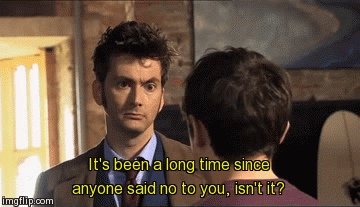
Ultimately the truly tragic similarity between the story of Jessica Jones and real life intimate partner and sexual violence is that no one believes them. With the exception of Trish, everyone refused to believe in Kilgrave’s ability until they saw it, experienced it for themselves. Even with aliens falling out of the sky, men turning into giant green hulks, and billionaires zipping around the world in iron suits, no one wants to believe in mind control just like no one wants to believe they could be a victim. Jeri, Detective Clemens, even Luke, who trusted and cared for Jessica, refused to believe Jessica until they became victims themselves. Now I know what you’re probably thinking, believing in a guy who can control people with his mind is a pretty tall order. And it’s true, it is. What’s sad is that believing a survivor of domestic and sexual violence is not a tall order, and yet it receives the same skepticism and downplaying as a super villain.
184 notes
·
View notes
Text
Quidditch of Happiness
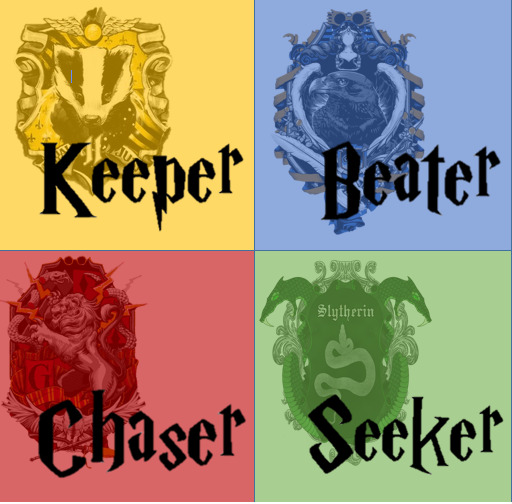
Allow me to introduce the Crowning Achievement, the piece de resistance, of the Sorting Philosophy that my friends and I explored: The Quidditch of Happiness.
We were attempting to determine how each of the four houses go about finding and acquiring happiness. With a little bit of finagling we discovered that each of the quidditch positions aligned rather nicely with one house’s pursuit of happiness. If you’re starting to scratch your head in confusion, don’t worry. It will all make perfect, nerdy sense by the end.
Hufflepuffs are the Keepers. A Hufflepuff is a master of making the most of things and being content with what they have. They can find the silver lining of any situation, essentially taking whatever circumstance in which they happen to find themselves and making it what they want. And once that happens they hold onto it (or them), protect it (or them), and Hermione help the fool who tries to take it from them.

Being able to Jedi mindtrick one’s reality into becoming their dream life is a very impressive feat and kind of the most practical. As Dumbledore so wisely put it,

The only risk of the Keeper position in the Quidditch of Happiness is that a Hufflepuff will be so set on holding on to the happiness that they have, that they won’t take the chance on perhaps finding greater happiness, they’re too quick to settle.
Gryffindors are the Chasers. To a Chaser, happiness is external. They look around and they say “Ah! My happiness is over there! I have to go there to be happy!” If I move to London, if I marry that girl, if I get that job, I’ll be happy; that is the mindset of the Gryffindor Chaser. In my experience, Gryffindors also seem to be the most open to assistance and collaboration. Finding happiness is not a solitary activity for them.
The weakness of the Chaser Method is the grass is greener syndrome.

They can tire themselves out zipping all over the field trying this and trying that, never pausing long enough to A: figure out if what they’re chasing is really what will make them happy. That being said, you could also interpret the Chaser’s position of flying all over the field, scoring a few points at a time as a rejection of the idea that a person’s happiness can be confined to one big thing. Rather, it’s a conglomeration of hundreds of thousands of little things happening all the time.
On that note, enter Slytherins. Slytherins are the Seekers. Very similar to Chasers, Seekers also view happiness as external, as something that needs to be attained. Unlike Gryffindors/Chasers, Slytherins tend to dream big and dream focused. They aren’t content to accept hundreds of little happiness points over the course of a game, they will wait for the big one. A Seeker of happiness likes to hang back and observe the field, taking everything in but not actively seeking for anything until they know exactly what it is and where it is and how to get it. But once their happiness does find its way into their crosshairs, they pursue it with astonishing intensity, speed, and focus.

Nothing and no one will stand in their way as they jet across the field like the freaking Flash until they have have whatever it is they think will make them happy held tightly in their fingers.
Finally, we have the Ravenclaws. Now I know that this will seem like a bit of a stretch but I have the validity of this concept on the good authority of several Ravenclaws. For those of you keeping track, it should come as no surprise that Ravenclaws are the Beaters. This doesn’t apply so much to the way they pursue their happiness but more of what they do once they’ve figured out what it is. Now I mean no offense to all you wonderful Ravenclaws out there, but I don’t think I’m being too ridiculous when I say that Ravenclaws don’t tend to have the closest relationship with emotions and feelings. They value reason and empiricism far too much. So much so, that even when they do look at emotions, it’s often through the lens of rationality. Which is not necessarily a bad thing.
With this lens of reason, happiness can be interpreted almost as an equation. As in, if you do this and this and this you’ll be happy. So you’ve got a Ravenclaw running around saying “There! I solved it! I solved happiness!” And then, taking that happiness equation in their hands like a beater’s club, they go to everyone around them and hit them with it, trying to make them happy too.
The main weakness with this position is that people usually don’t like other people to tell them that A: they’re doing their own happiness wrong and B: this is how you should be doing it. Even though the Ravenclaw’s intentions are completely genuine! And even if they’re right! And I mean, they’re a Ravenclaw so they probably are.

So there you have it. The Quidditch of Happiness. Maybe we took our Sorting Philosophy too far. It does sort of sound like something a crazy person would say. But The Quidditch of Happiness also has a really cool ring to it so I’m standing by it.
3 notes
·
View notes
Text
I’m About to Get my Humanities all over Your Science

It seems as though I’ve been using fiction to explore the purpose of living a lot recently. In The Walking Dead I tried to figure out why the characters continue to fight so hard to survive when their lives so utterly...suck. Death and loss piled on top of danger and ruthlessness, all coupled with the terrible smells of both the undead and the unwashed. The conclusion I drew was that they survive out of habit and out of the vague hope that life will get better, that they will one day escape the labyrinth of suck in which they are currently wandering.
While reading The Martian I found myself asking a similar question: why is Mark Watney trying so hard to survive? What compels him to keep fighting the good fight despite his terrible odds of survival? Unlike The Walking Dead characters, Watney has the benefit of real hope. Earth is right next door (planetarily speaking) with its hot showers, its Netflix, its ketchup and absolutely no zombies of which to speak. If he can just not die for a little while there is a very real chance he could get all of that back.
But more than the hope of living, I feel like the real thing that keeps Watney going is the puzzle of the situation. Survival for him is the ultimate brain teaser; it requires a whole lot to maintain the basics of breathing and eating and not exploding.
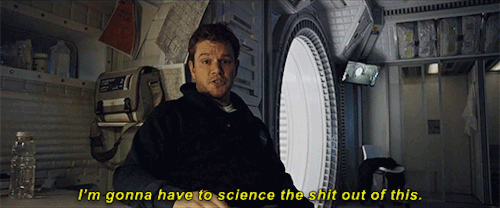
Watney lays out his situation for the reader fairly clearly: “If the oxygenator breaks down, I’ll suffocate. If the water reclaimer breaks down, I’ll die of thirst. If the Hab breaches, I’ll just kind of explode. If none of those things happen, I’ll eventually run out of food and starve to death.” It requires math, mechanical knowhow, and buckets and buckets and buckets and buckets of ingenuity. For a guy like Watney, figuring out how to keep living is his version of sudoku, it’s a way to pass the time. How else is he going to entertain himself as he inches closer towards death? It’s made abundantly clear that the TV shows and music available to him are not going to cut it.

The combined genius of Watney, NASA, and pretty much the whole outer space community felt like an anthem to the human race. If you want to feel patriotic (and you’re American), visit the Lincoln Memorial. If you want to feel proud of the human race, go to a space program, go to NASA. It’s the ultimate “Look what we can do!” for humanity.
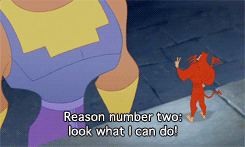
There are many different arguments for what makes humans different from other species: curiosity, collaboration, empathy. While all of those things definitely come into play in this novel, The Martian seems to make the fairly convincing argument that it is humankind’s capacity for ingenuity that makes us so stinking cool.
But as cool as we may be, the novel went deeper than exploring the cleverness of the world’s top scientists. It explored the possibility of the whole world coming together to save one person. When considering all of the millions and millions of dollars that went into rescuing him it seems a little far fetched; much less likely than his ability to grow potatoes on Mars. Watney chips in on this discussion with his own opinion: “Part of it might be what I represent: progress, science, and the interplanetary future we’ve dreamed of for centuries. But really, they did it because every human being has a basic instinct to help each other out. It might not seem that way sometimes, but it’s true…If a hiker gets lost in the mountains, people will coordinate a search. If a train crashes, people will line up to give blood. If an earthquake levels a city, people all over the world will send emergency supplies. This is so fundamentally human that it's found in every culture without exception. Yes, there are assholes who just don't care, but they're massively outnumbered by the people who do.”
I think that is beautiful and poignant and true in a lot of ways, but it’s also lacking one nuance. I agree that people are fundamentally compelled to help each other in certain instances, but if that were completely true why are there so many suffering people in the world? People are totally willing to fork over some cash to help victims of a hurricane but not to drop some coins into the cup of the guy begging on the subway. Why? What’s the difference? I’ll tell you what I think the difference is:
People need a direct target for their altruism. There are so many people in this world that need our help but the thought of caring about every person in the world is overwhelming, not to mention impossible. To pull a random quote from Ever After of all places: “I used to think that if I cared about one person then I would have to care about everyone. And I’d go stark, raving mad.” It’s hard to summon any feeling for the hungry guy on the subway because we know that there are thousands like him and furthermore a couple of quarters given by one or two people won’t make a lasting difference.

But one specific crisis, eg a lost child, a hurricane, a funny astronaut stranded on a planet that is constantly trying to kill him, has a clear endgame and obvious problems. As such, when a major catastrophe happens a whole host of humans are able to direct their altruistic focus on one thing, and become a veritable juggernaut of helpfulness.
1 note
·
View note
Text
Literal Rock Gods: Modern Deities According to The Wicked + the Divine
I just finished The Wicked + the Divine and I’m smitten. We’re talking now-cosplaying-as-Luci-for-ComicCon smitten. To pull from the jacket: “Every ninety years, twelve gods incarnate as humans. They are loved. They are hated. In two years, they are dead.” The gods of this universe are superstars. Literally. Each god bears a striking physical resemblance to a pop star.

Now most people recognize this correlation as a metaphor for the way people idolize celebrities, elevating them to a godlike status. And it totally is! I could spend this whole post talking about the creepy way society objectifies celebrities so it can better consume them. How, because celebrities are public figures, people seem to assume the public has a right to their personal history, personal relationships, and personal space. And I could tell the story of how, as a volunteer for Comic Con I got to spend three hours watching hundreds of people pay small fortunes to line up conveyor belt style, in order to be in the presence of a TV star for 10 seconds. But I don’t want to. I would rather use The Wicked + the Divine to talk about something else. Namely, what purpose god(s) serve the societies who worship them and subsequently what The Wicked + the Divine suggests modern, Western society is looking for in a deity.

From my understanding, classical gods such as the Greek and Roman pantheon primarily served as explanations for the puzzling world around them. Where is that thunderstorm coming from? Zeus. Why the Hades is that mountain spurting fire? Vulcan. Why can’t I stop thinking about Hortensius? Cupid. Because their primary function was one of explanations, classic gods could be capricious, morally bankrupt, sociopaths because...nature is a capricious, morally bankrupt, sociopath. But here’s my theory: as science started provided better explanations for the phenomenons (ie electricity, plate tectonics, and libido. And even though science is a long way from explaining everything, it’s explained enough to be getting on without the need for Zeus and all his pals.
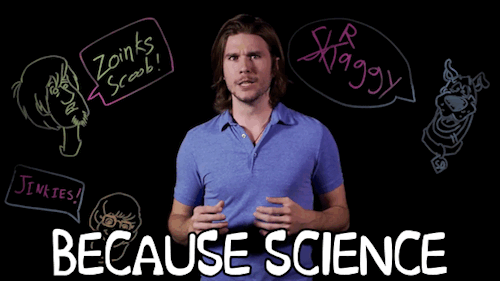
As explanatory gods were weeded out, the remaining gods were ones that provided explanations to questions of morality. Society needed a god to act as tour guide for the ethical journey it was now taking. This god is both a moral example to and a moral judge of society. But Western society hasn’t really been inviting God to the morality meetings for a while now, confident that we can figure it out on their own. Just like its scientific explanations for the natural world, humanity is a long way off from solving all its ethical problems, but it’s getting more confident in its own moral maturity to answer them without help.

With this in mind, what purpose could deities serve in the up and coming Western culture? This, I believe, is the question that The Wicked + the Divine attempts to answer. At first, The wicked and the divine gods seem very similar to the classic gods with their moral relativism and the fact that, you know, they ARE those gods. But Wicked + Divine has taken those deities and tailored them for a modern audience. With only two years to live, these gods are like the divine equivalent of a YouTube video.
That two-year lifespan makes a for a crazy juxtaposition between immortality and death. Most gods acted as the vehicle to immortality for their believers. But in Wicked + Divine, the gods are immortal, but the people whose lives they steal will die. These gods are all about living in the moment and accepting the inevitability of death. Their purpose is to force their worshipers to confront their own mortality, be it through escape:
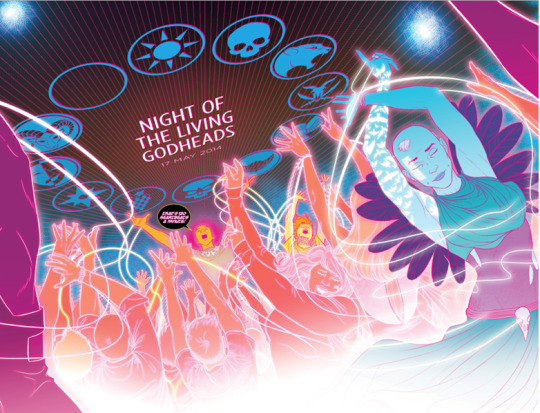
blunt nihilistic statements:

(Although polite society dictates that existential crises be conducted in the privacy of your own home)
Or, hopefully, by acceptance and the acknowledgement that the only form of immortality is through inspiring the people that will live after them to make a change:

(who knew the Kanye equivalent would have the most wisdom?!).
Regardless of your beliefs or how you felt about Wicked + Divine’s take on gods and religion, you’ve got to admit it’s impressive for a comic book about popstar gods to have nihilism, escapism, and humanism all at the same time.
1 note
·
View note
Text
Making Love not Horcruxes: How the Different Hogwarts Houses Love

It’s time to return once more to The Sorting Hat Postulate. Last time we determined how each of the four Hogwarts houses make decisions, now we’re going to look at how they love. And I’m talking any kind of love not just romantic love. Because that’s dumb. I’m not saying romantic love is dumb but I’m saying it’s dumb how society has elevated romantic love to such a height that it has become the de facto term whenever love is discussed. There are dozens of other kinds of loving relationships: friends, parents, siblings, teachers, yourself, your dog...
We’ll start with Gryffindor. Gryffindors love COMPLETELY.

They put their whole selves into a relationship. They dive in head first and love with their whole being. They are very expressive and passionate. Think of Anna from Frozen to whom love is an open door to be barrelled through with one’s whole heart without pausing to consider...anything really.


Just ride those feelings until they turn your head over your heels. The only potential downside to the love of a Gryffindor is that, like most Gryffindor emotions be it anger, excitement, or sadness: it can be a flash bulb. It bursts instantly and blindingly onto the scene but just as quickly can fade, often because of a greedy, duplicitous guy named Hans. But while they’re in that moment, however long that moment may last, they’re in it all the way. They love you SO MUCH!
Ravenclaws, being the emotionally stunted little dears that they are (see Simon from Firefly, who is so sweet and so smart, but he’s an emotional idiot. It doesn’t help that he’s a secondary Hufflepuff, so that even if he does manage to recognize his feelings, the odds of him actually acting on them are...zero),

may take awhile to love. While it’s true that you may get some Ravenclaws who are emotionally literate, it’s highly logicized. Like Will Smith’s Hitch, who is not just emotionally literate, but an expert in relationships. As such, when Ravenclaws love, they love CONFIDENTLY. They’re confident because they’ve done their research, crunched the numbers, analysed the data, run simulations, conducted surveys. They don’t love someone based on flighty, effervescent feelings, but hard evidence. “I know I love you and I know you love me (because of x, y, and z).”
Hufflepuffs, and I have this on the authority of several Hufflepuffs, love CONSTANTLY. To me, that sounds weird, but this is how my Huffle-buddies explained it to me. For Hufflepuffs, love is a feeling that is continuously felt; they are always working on it for it is a task that never ends. The best example of Hufflepuff love is The Last Centurion, good old Rory Williams (Doctor Who).

His love of Amy is steady, constant, and self-sacrificing. By its very nature, that steady, constant nature, Hufflepuff love often becomes so constant that it can fade into the background. Like the wall of a house, it is a critical structural component that no one notices until they fall back on it. It doesn’t hurt that Hufflepuffs also tend to love quietly, unassumingly. While a Gryffindor may use grand, romantic gestures that sweep you off your feet, a Hufflepuff shows his/her love through quiet, day-to-day acts of service. My Hufflepuff friends encapsulated Hufflepuff love with the phrase “I am loving you,” which again, sounds weird to me but they like it; they say the progressive tense suggests, well, progression and continuousness. But when I try to encapsulate the love of a Hufflepuff it’s not a phrase at all, just that comforting hand on your shoulder.
Finally the Slytherins. Slytherins love DEEPLY. The phrase “still waters run deep?” Yeah, that has Slytherin written all over it. It’s hard to spot on the surface because Slytherins keep their emotions so close to the chest, but theirs is a profound devotion everlasting. There is no finer example of Slytherin love than that of the ultimate Slytherin: Severus Snape. Snape kept his love buried deep within him and never let it show. But his love for Lily transcended everything else: purity of blood, the allure of the Dark Arts, his hatred of James, even Voldemort. JK Rowling very bluntly stated that if it weren’t for his love of Lily “he wouldn’t have been remotely interested in what happened to [Harry].” It fundamentally shaped everything he did. Sigh. Gotta love Snape. You don’t have to like him, but you gotta love him. Cersei Lannister is another really good example of the everlasting love of a Slytherin, albeit a less-palatable one. Oh! And the phrase that encapsulates Slytherin love?
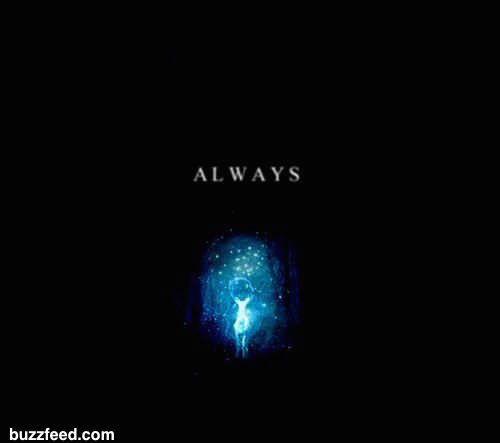
5 notes
·
View notes
Text
Noble Brooding Sad Man: the Male Answer to the Manic Pixie Dream Girl
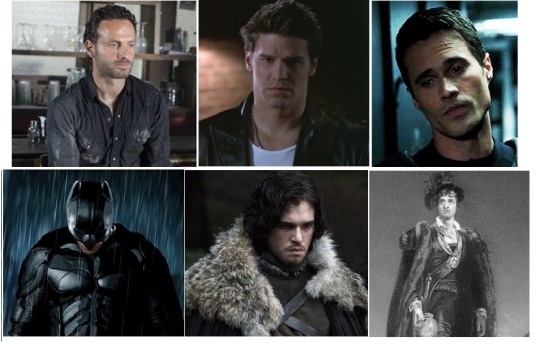
Manic Pixie Dream Girl is a controversial literary term coined by film critic Nathan Rabin to describe "that bubbly, shallow cinematic creature that exists solely...to teach broodingly soulful young men to embrace life and its infinite mysteries and adventures." MPDGs possess an uninhibited, childlike playfulness, are beautiful and quirky, and their issues aren’t annoying, they’re endearing. Needless to say MPDGs don’t exist in real life. They are also almost exclusively female. One could argue that Augustus Waters of The Fault in Our Stars is a Manic Pixie Dream Boy but he’s really the only one and you sort of need more than one character to make a trope.
To me the male answer to the MPDG is what I’m calling the Noble Brooding Sad Man. They’re everywhere! A bit like the Byronic hero, the Noble Brooding Sad Man usually has a past draped in anguish and tragedy that has caused him to view the world and himself (the NBSM is absurdly introspective) with woebegone cynicism. Unlike Byron’s heroes, NBSMs lack cunning and sophistication and instead have an overactive sense of nobility and chivalry. In many ways their nobility is what makes them so frakking sad all the time. He alone is there to combat the overwhelming darkness of the world while his own inner darkness threatens to envelop him and blah bla-blah blah angst angst angst.
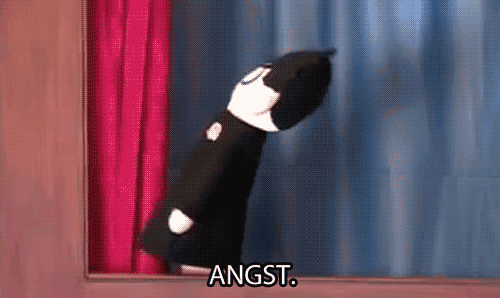
I discovered the trope when I started watching Buffy the Vampire Slayer for the first time because it’s summer and all of my other fifteen shows (not exaggerating) are on hiatus. Now I like Angel’s character a lot but in his third appearance on the show where he emerges from the shadows, mysteriously warns Buffy about something or other, and then gives her his coat, I thought, “Oh no. It’s Jon Snow all over again!” It was just so over-the-top, cliche, chivalry blended with over-the-top brooding. Like Angel, I like Jon Snow a whole darn lot, I think he’s a nice guy with some very fine qualities, but hanging out with him would be the WORST. The problem I have with Jon Snow is the same problem everyone who has a problem with Jon Snow has with Jon Snow. He’s always sad. Even when he’s happy, it’s a sad sort of happy.
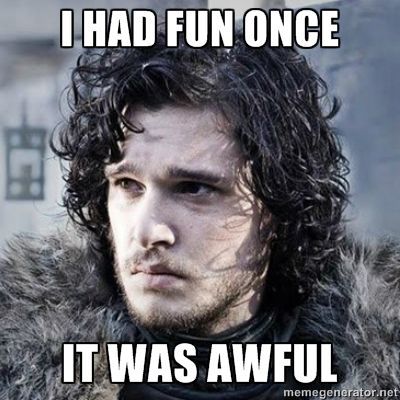
Both Angel and Jon Snow are two guys whose eyebrows are in serious danger of cramping from overbrooding. The more I got to know Angel’s character, the more I desperately wanted him to snap out of his uber-serious melancholy and make a “that’s what she said” joke. Something about wooden stakes and the hellmouth and being punctured. Wouldn’t that just be magic? It wouldn’t even be hard (hahaha that wasn’t even on purpose! That’s how easy they are). But Angel is just too tortured, too good, and too sad.

Not even the whimsy of puppetry can make Angel happy!
I started looking through all of my other fandoms and the same kind of male romantic, protagonists started popping up everywhere! Rick Grimes, Batman, Agent Ward, even freaking Hamlet.

Although, to be fair to Hamlet he did crack some pretty awesome jokes.
Both MPDGs and NBSMs are beautiful, passionate, and are held as romantically desirable despite their many personal flaws. Indeed, much like the MPDG’s flightiness and tendency for rule-breaking, a NBSM’s tortured past, sadness, and introspection make him somehow more attractive. I don’t get it either but apparently it’s a thing.
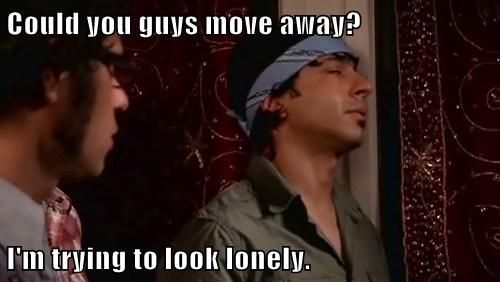
The main difference between the two archetypes is the purpose they serve. Rather than youthenizing their love interests (yay for morbid puns!) as MPDGs do, a NBSM’s job is to maturize them. He offers protection (both physical and emotional) to the young girl he loves while he helps her to abandon her childish, naive notions of the world. Think of all the times Jon Snow tried to tell Ygritte that her cause was doomed. How often did Rick tell his makeshift family that there is no sanctuary? That the world is a dark, zombie-ridden place and that they should all just get thee to a nunnery...oops, wrong Brooding Sad Man.
Now we come to the So What portion of today’s musings. For without exploring the societal implications of these tropes this blog is merely a “hey! look at all these similar characters that exist in multiple fandoms! That’s interesting!” No it’s not. It’s boring. Writer and actor Zoe Kazan provides a nice segue into such discussions in her criticism of the MPDG term. She argues, “what bothers me about [the term] is I think that women get described that way, but it's really reflective of the man who is looking at them, and the way that they think about that girl. Not about who that girl really is or what her personality actually is.” And it’s true. The MPDG is much more useful as a critique of the male gaze than a critique of female characters. Case and point: 500 Days of Summer. Nicely played Miss Kazan. I see your table-turning character analysis and I raise you a reader-response theory. What about these archetypes do people find so attractive that they would appear so regularly in fiction? For MPDGs I think it is the idea that they are forever young and that their youthfulness is somehow transferrable. Both scenarios imply that women are less advanced than men--the woman is not a woman at all but a girl. They are fundamentally immature, flighty, and in need of male guidance. While the NBSM implies that men treating women as incapable and bottling up all their trauma, angst, and emotions until it permanently warps their eyebrows is the height of sexiness. FYI: it’s not. Or it shouldn’t be.
http://www.avclub.com/article/the-bataan-death-march-of-whimsy-case-file-1-emeli-15577
http://bitchmagazine.org/article/forever-your-girl
2 notes
·
View notes
Text
How to Decision Like a Lion, Badger, Eagle, or Snake

Let’s go back to the Harry Potter universe because A: It’s Harry’s birthday and we must celebrate with analytical psychoanalysis. B: I promised I would, C: it’s the best, D: we barely scratched the surface last time. It’s time to go deeper!
Determining the defining differences between each house means we had to first figure out what the defining aspects of being human were (According to five, completely unqualified undergrads). What are the categories that make up a personality? In today’s post I’m going to cover the first of what we came up with (Or rather, the first of what...up with which we came...yeah. Grammar).
Decision-making in the Houses of Hogwarts--Alphabetically
GRYFFINDORS: Gryffindors go with their gut. Almost exclusively. They have a feeling, and then they act on that feeling. Which works surprisingly well for them. Just look at Harry, he doesn’t think anything through and yet his half-baked, or more often still-batter plans still work out relatively well. With next to no thinking, Harry usually ends up doing the right thing. Which can be why the other houses find Gryffindors so insufferable and undeserving of their success. The Gryffindor method of decision-making also means that they are generally the first to act. While the rest of the houses are still trying to sort things out, the Gryffindors have already run into the burning building and grabbed the puppy.
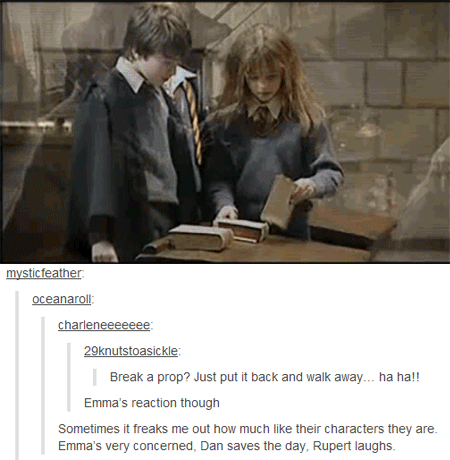
Of course it sometimes goes that if they had just paused for two seconds they would have realized that the puppy had run out on its own but a Gryffindor would pretty much always rather be doing something, ANYTHING rather than nothing, even if it is the complete wrong thing. Their desire for action means that Gryffindors are typically the best at improvisation and are not deterred by impossibilities. Their motto for making decisions is “brave, stupid, and out of options.”
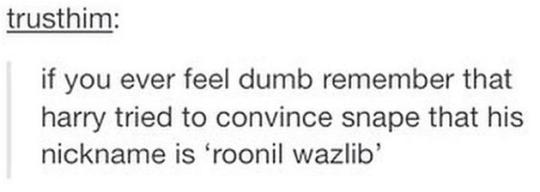
Like I said: brave, stupid, and out of options.
HUFFLEPUFFS: in many ways the opposite of Gryffindor. The way that my Hufflepuff friends described the way Hufflepuffs make decisions involves a never-ending process of thinking and feeling. They have an initial emotional response which they then think about. And they think about what other people are probably feeling. And they think about what would be the best thing to do. Then they try to figure out what feels right. And then they think about how they feel about what they’ve been thinking about what they were feeling. And after all that, they usually decide that it would be better to do nothing at all. To them choosing to do nothing is perfectly valid, usually the best, and almost always the safest decision to make.
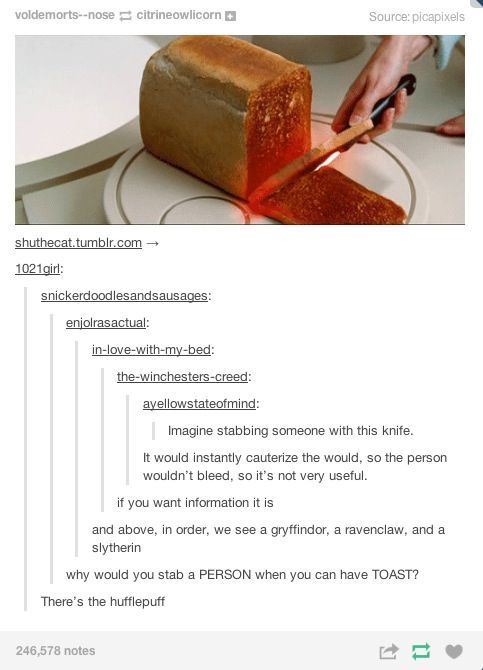
RAVENCLAWS: Also, in many ways the opposite of Gryffindor in the sense that they ignore whatever they feel about a situation and try to approach it logically. Initial feelings are usually irrational and making decisions based on irrationalities leads to stupid decisions. The Gryffindor method involves way too much trial and error for the intellectual Ravenclaw. When it is clear that something isn’t working, a Gryffindor is (usually) quick to run to the next idea (and the next one and the next one and the next one), but from the Ravenclaw perspective if they would just ditch their emotions and take a breath, they would save themselves all that legwork and all that looking stupid.

SLYTHERINS: unlike the Ravenclaws, Slytherins completely acknowledge their initial feeling. That emotional reaction will fuel the entire process and give them their purpose, their endgame. But unlike the rash Gryffindors they don’t act off of that initial emotion, they use it, temper it perfectly to fuel their incessant planning and preparation. They think it out. Weigh the options. Come up with the best course of action. And then they act. It’s why Slytherins are so good at vengeance. It’s like they let their feelings pick the destination but they have their minds navigate the best way to get there. To put it another way:
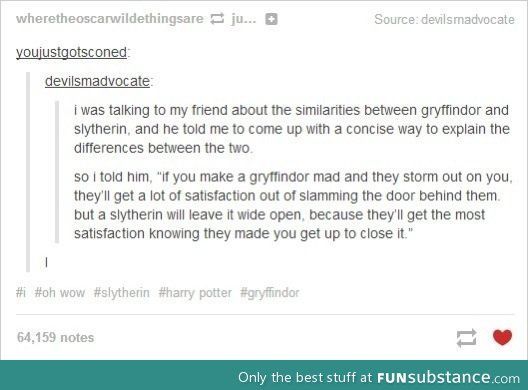
So to offer you a simplified summary:
Gryffindors: feel then act
Hufflepuffs: feel then think then feel then think, then feel, etc
Ravenclaws: think then act
Slytherins: feel, then think, then act
You’ll note that it’s only the Slytherins who have all three components. So stop ragging on the Slytherins! They’re awesome! I’m pretty sure that was the lesson to be learned here.
Anyway, happy birthday Harry! and happy belated birthday Neville! Many happy returns!
2 notes
·
View notes
Text
We Need More! Diversity in Genre Fiction and Pop Culture

I used to think that genre fiction was like a haven to explore and showcase a more diverse range of characters. When whole species of aliens that look like walking fish, walking televisions, and walking carpets (bipedalism is apparently very important) get thrown into the mix,

shouldn’t the human races just become...the human race? In worlds of fantasy where magic is the weapon of choice, can’t any gender fight? Magic is no respecter of genders. To quote J.K. Rowling herself, “when you take physical strength out of the equation, a woman can fight just the same as a man can fight, a woman can do magic just as powerfully as a man can do magic” (“The Women of Harry Potter”). And finally, in a universe with Jack Harkness, any sexual orientation is possible.

And then I went to the BookCon panel by the organization We Need Diverse Books (that’s their logo at the top of the post). And it was pointed out to me that in many ways genre fiction consistently falls short. Just look at Lord of the Rings. Goblins, elves, dwarves, and sentient trees, sure no problem. But a black guy??? Don’t be crazy. Admittedly it’s true that when there are diverse characters in genre fiction they are consistently awesome.

That’s not the real problem. The real problem is that there’s not enough of them and the ones that there are are rarely in the center of the poster.
Take The Avengers for example. I’m not going to rant, rage, and rhetorize (it’s a word) about the injustice of Marvel’s refusal to make a Black Widow film (except say, make a Black Widow film. Seriously. Do it. Now. Do it right now. The frack is wrong with you?! Stinking muggles.) Instead I want to focus on the intense rage that came in response to her characterization in Age of Ultron.
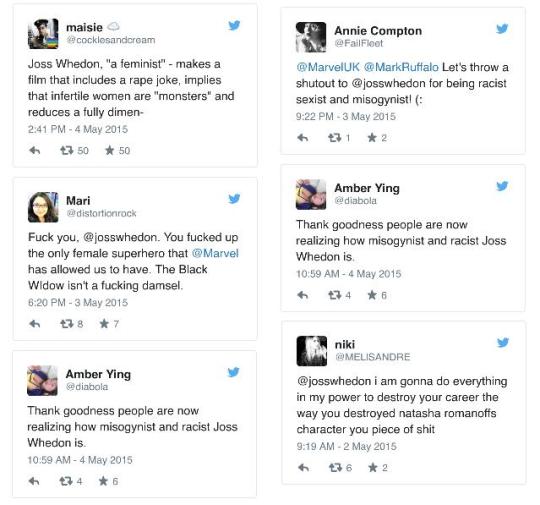
Internet, I love you. But why must you be so mean?
While we could get into all sorts of hate-filled rage battles that turns us all into hulking trolls, it’s ultimately the Hulk himself who finally hit the nail on the head:
“The real problem, according to Ruffalo, is the serious lack of female stories being told in superhero films, which puts an unnatural amount of pressure on the stories we DO get. ‘The guys can do anything, they can have love affairs, they can be weak or strong and nobody raises an eyebrow,’ he noted. ‘But when we do that with a woman, because there are so few storylines for women, we become hyper-critical of every single move that we make because there’s not much else to compare it to’” (Victoria McNally interview, “Mark Ruffalo Drops Some Truth Bombs About Black Widow’s Controversial ‘Avengers’ Storyline”). Oh Ruffalo. If only I could rain down high fives onto your hands. With so few diverse characters to choose from, particularly in genre fiction and pop culture, the ones that do exist are forced to fulfill the expectations of an entire movement. They must be icons, not characters.
When a show/film/comic book chooses to include more characters from minority groups, the weight of the ideological movement can be spread across the shoulders of several characters. Shows like Orphan Black and Sense8 are stellar examples of filling their rosters with women, multiple ethnicities, and multiple sexual orientations (sidenote: I’m in love with Sense8. I’m not sure if it was poorly marketed or if all my geeky friends have just been too busy but I feel like I’m the only one in my whole circle who is watching this show...it’s iZombie all OVER again! Someone, please watch it. And then talk to me about it). The creators of these shows are able to better represent the many facts and complexities within different groups simple because they have more characters within each minority group at their disposal.
Because these “minorities” are a lot larger than the term seems to imply. Here, have some maps and charts to better prove my point.
Map of the world if a country’s size was relative to its population. Just look at teeny tiny cutey patutey (spelling?) America and the skittles-sized European countries!

I grew up in Utah, where the white slice is very much the biggest slice in the racial pie (chart).
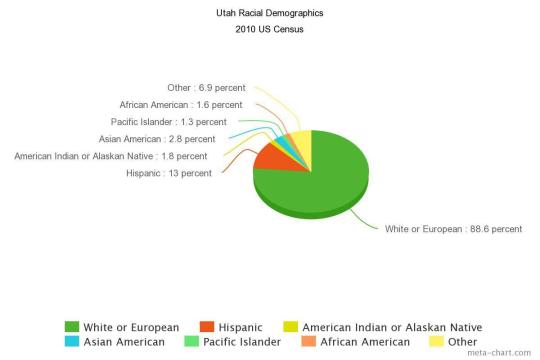
But then I moved to NYC. I am writing out this post on the subway and right now there are 27 people in my car. Of those twenty-seven, fourteen are Black, eight are Hispanic, three are Asian, and two are White. Seriously. In this car, the majority is not the majority. For the Ravenclaws out there who like evidence that isn’t anecdotal, here. Have a pie chart:
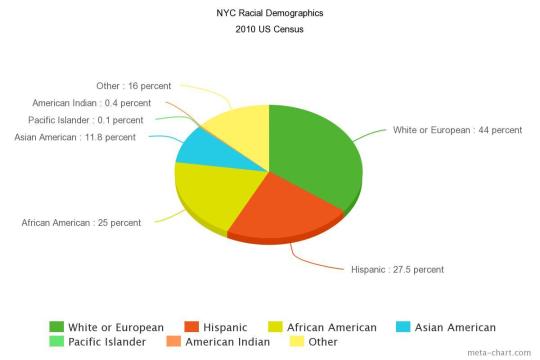
So isn’t it time that genre film step up and start better representing the reality of its viewers? The numbers demand it! And according to a ton of fictional characters, “numbers don’t lie.”
This is why pop culture matters even more so, I would argue, than serious, controversial “art.” Because what is popular inevitably becomes what is “normal.” So as long as pop culture keeps making shows and films where the straight white guy is always the main character, and the one woman, the one person of color, and/or (more often “or”) the gay guy is shunted to the sidelines (I’m looking at you Fantastic Four. And Iron Man. And Captain America. Pretty much all the superhero movies) that is how society will continue to perceive the world. Pop culture shapes the world reflects, it holds the freaking chisel. So come on genre fiction! Give us more! not better, you’ve already given us better. And for that we are grateful. Now we just want more! You can do it! I BELIEVE IN YOU!
1 note
·
View note
Text
Hogwartism? The Hogwarts Houses Theorem? The Sorting Hat Postulate? I’m not sure what should this be called...
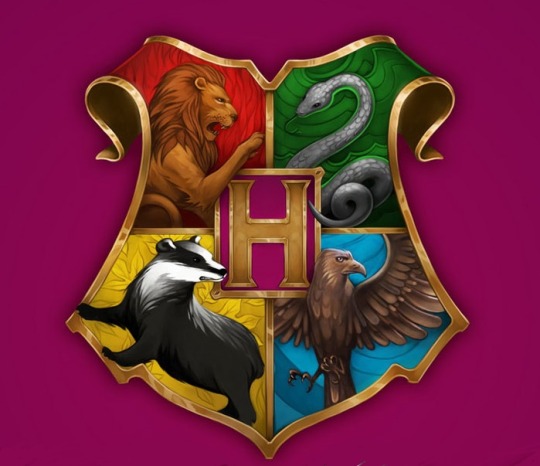
For this week and the next I'm going to cheat a little by pulling from a philosophy that my college roommates and I developed and perfected several years ago. It all began with Downton Abbey. We were casually discussing the motivation of Lady Mary I believe, when one of us explained that the reason behind her behavior was because she was in Slytherin.What inevitably and immediately followed:
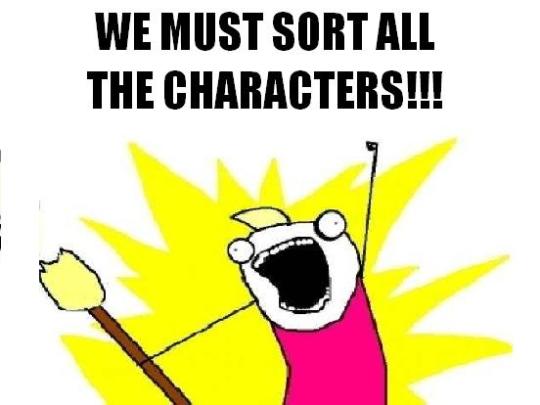
Over the course of the next couple of months, as we sorted every fictional character on which we could get our metaphorical mitts, a full-blown philosophy sprung around our efforts. In this blog post and the next, I’m going to attempt to articulate the finer points of that philosophy.
First thing's first, I've got to lay out some basics:
Secondary houses. They're a thing. And the thing that they are is the house to which a person most identifies after their first, primary house. An easy example would be Hermione who is a primary Gryffindor, secondary Ravenclaw. A more debatable example would be Bruce Banner who I argue is a primary Hufflepuff, secondary Ravenclaw, or a Huffleclaw if you wish (Most people would swap those for Bruce so I should warn you that these are just my opinions. Albeit my deeply thought-out, evidence-supported opinions so go ahead and try to challenge me!).
Second thing’s second: I’m going to articulate one key element of each house that is essential to understanding the way they all operate.
Let’s start with Hufflepuff, because no one ever starts with Hufflepuff.
Hufflepuffs are not the lame, leftover wimps that everyone thinks they are. Just look at their house emblem if you don’t believe me: it’s a badger.

Badgers are independent and unassuming unless you provoke them or their own. Such it is with the Hufflepuff clan. The evidence for the hidden ferocity of the Hufflepuff rests in the entrance to their common room, which will shoot vinegar at would-be intruders, as opposed to the Gryffindor common room where the Fat Lady would just sass you. Hufflepuffs are happy to quietly do their own thing and let you do yours, unless you poke their badger. Do NOT poke their badger. It's different for every Hufflepuff, that line that should never be crossed, that button that should never be pushed, but they all have it. Maybe it's bullying the small, or cheating, maybe it's someone taking two cookies instead of one (well, they're still Hufflepuffs so it's probably more like taking 17 cookies instead of one), but every Hufflepuff has their limit. Demons may run when a good man goes to war, but everyone should run when a Hufflepuff has his/her badger poked. So I repeat: do NOT poke the badger.
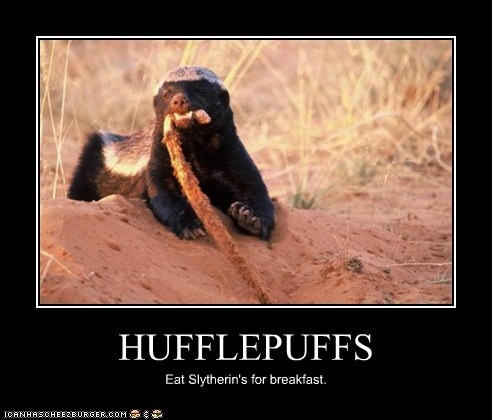
(that typo was there when I got it but the point still stands!)
Speaking of Slytherins...! Let’s look at the house that is even more misunderstood than Hufflepuff.
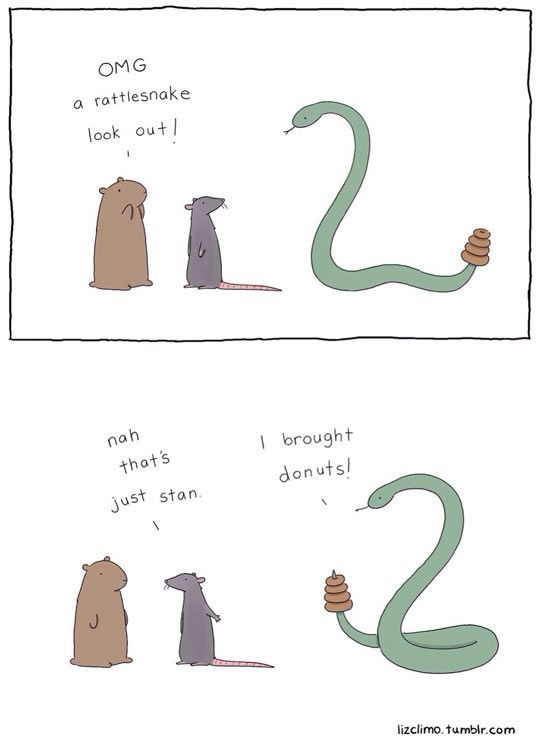
Top at the list of misconceptions is that they are self-interested cutthroats who would feed their best friend to the acromantulas so that they could take their spot on the quidditch team. NOT TRUE. I cannot emphasize this enough. A Slytherin would NEVER feed their best friend to a herd of acromantulas or any carnivorous conglomeration. That jerk who always cuts in line...maybe.
What I'm saying is that Slytherins are FIERCELY loyal to their friends, but they don't tend to fret over the rest of the world. Slytherin-level loyalty requires a degree of exclusivity. Practically speaking, a person can't be THAT loyal to that many people so they create for themselves what my friends and I have dubbed The Inner Circle. If you happen to fall inside the inner circle of a Slytherin, then congratulations you've got yourself the truest of true friends. The "I'll distract the dragon while you get the egg," "Let's put the body in my trunk," "if you got a problem with my friend, you've got a problem with my foot up your fundament" kind of friend.
Next up: Gryffindors.

The house that gets all the attention. But contrary to popular belief, the core element of Gryffindors is not bravery, rather it is a personal moral code. This code doesn’t necessarily have to coincide with any sort of legal code, it doesn’t even have to make any sense to anyone but the Gryffindor to whom it belongs. Pirates for example, make surprisingly excellent Gryffindors (at least, the romanticized, swashbuckling, piratical rogues of Hollywood. Real life pirates probably just made excellent homes for diseases). But this individual, moral code is what guides Gryffindors through life, they are going to do what they feel is right, regardless of danger, logic, practicality, feasibility, and what everyone else might be telling them.
If you ask a muggle what a Ravenclaw is, they'll probably say "the smart ones" (actually, a muggle would probably say the sharp nail at the end of a raven’s foot but your average, run-of-the-mill fan would say “the smart ones”). But what your average fan wouldn't know is that Ravenclaws are also the hipsters of Hogwarts (no offense Ravenclaws. If it makes you feel any better I maintain that everyone is a little bit hipster and there's nothing wrong with that--you be you).
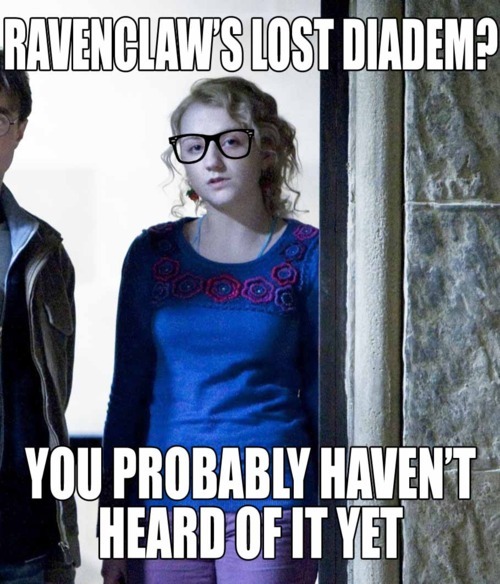
Yes, Ravenclaws value knowledge and intelligence but that makes them curious and the curious also value the unique, the innovative, and the strange. This makes them very accepting people. To quote the introduction to Ravenclaw on Pottermore: “geniuses are often out of step with ordinary folk, and unlike some other houses we could mention, we think you’ve got the right to wear what you like, believe what you want, and say what you feel. We aren’t put off by people who march to a different tune; on the contrary, we value them!” Case and point: the loveable Luna Lovegood.
Okay. Maybe this is going to take more than two posts. Maybe I’ll have to do a Hogwarts House Philosophy post every other time until it’s all out there. In the mean time, Happy Sorting!

1 note
·
View note
Text
Friendship to the MAX! Feminism for the Next Generation
This week I’m delving back into my favorite of all the literary theories: Feminist Theory, with my newest favorite graphic novel (I refuse to be limited by just one favorite):

Lumberjanes is about “five rad, butt-kicking best pals determined to have an awesome summer together” at Miss Quinzella Thiskwin Penniquiqul Thistle Crumpet's Camp for Girls Hardcore Lady Types (back cover blurb). Lumberjanes creators Noelle Stevenson and Grace Ellis gave Jo, April, Mal Molly, and Ripley each their own fleshed-out, individual personality, look, and talents. While this might seem like nothing special, when examining the rest of genre fiction and its portrayal of women, it becomes comparatively revolutionary. To illustrate what I mean, I’m going to turn to Anita Sarkeesian, a feminist media critic and blogger (you may remember her as the Utah State guest lecturer who was driven away by terror threats of mass shootings from the world’s whiniest terror group in the world: the meninists...my alma mater everybody!) and her concept of the Ms. Male Character which is “a female version of an already established or default male character.” In other words, creators take a male character, e.g. Pacman, slap a bow on him and voila! it’s now a girl. The most common visual elements to indicate female gender are bows, the color pink, makeup, high heels, and long eyelashes. I legitimately spent my entire childhood operating under the impression that girls had longer eyelashes than boys. Genetically. Which makes about as much sense as the crust of bread having more nutrients than the middle part, but I thought that too (it wasn’t until I was in college that my roommate shattered that myth--for those who don’t know, breadcrust receives the most exposure to heat, other than that it is the EXACT SAME as the rest of the bread...I’m not bitter about this). Anyway, the problem with superficial gendered signifiers, Sarkeesian argues, is that “it actively limits the range of available options by enforcing a narrow, restrictive and monolithic model for the portrayal of femininity...One look at her and you know she’s female, but not much else. Her defining characteristic is her gender.”
KACHOW! Here come the Lumberjanes. None of them even have eyelashes! I checked. They also get around with no makeup or high heels to boot (did you see what I did there??? high heels...boot…. I think I just earned my Pungeon Master badge). Each young girl is a fully-realized character who has been given her own distinctive identity, appearance, and personality. Even April, who does wear pink shorts and a bow-like headband (not to mention Little Mermaid hair), is not limited by the gendered signifiers she wears. Yes she may look like a stereotype, but she kicks serious butt and her physical strength literally defies physics (but, then again, so does a talking statue so it all works out).

Each character possesses a mix of traits that defy the gender binary, including the “scouting lads” from Mr. Theodore Tarquin Reginald Lancelot Herman Crumpet’s Camp for Boys. Only the boys’ camp director endorses gender stereotypes with claims like: “COOKIES ARE FOR THE WEAK. REAL MEN SHOULD BE SPLITTING WOOD AND SMOKING PIPES.” But all of the other characters treat him as the absurd he-man woman-hater that he is.

On the surface Lumberjanes may seem like an adventurous romp in the woods, and guess what? It is! That’s sort of the point. What really makes it a feminist masterpiece is that it’s really not about the feminism. What I mean is that it doesn’t approach its story like it has this feminist objective it’s got to prove. Rather, the novel has adopted a tone that seems to say, “um...of course women can be strong and smart and independent. Why are we still talking about this? Can we get back to the three-eyed foxes and the hipster yetis now?”

(related note: ”Why are hipster yetis so odd? ...Because they can’t even!” Might be the funniest joke I’ve ever read)
It’s what feminism is going to look like for all the millennials (personal note: I am not a millennial, I am of the Harry Potter Generation). Not the political violence of the suffragette movement or the burning of bras in the 1960s (although from my research into the 1968 Miss America Protest, while bras were used as a symbol of women’s confinement, no one ever actually burned them). Rather, feminism in the future, at least the one I like to imagine, will be accented with an exasperated sigh by the overwhelming majority at those few still resisting equality and a strong desire to move on to issues that are actually debatable; issues where one side is not rooted in an antiquated ideology.
Lumberjanes’s treatment of gender equality as an established fact is not only super and subtly convincing, it also allows the novel to focus on another message: Friendship to the MAX! In any other piece of fiction (or even real life) the personalities of the five different characters would clash horrifically. Sighs of exasperation, witty insults, and colorful bickering would abound. But none of that happens in Lumberjanes. It manages to do the nigh-impossible: be funny without being mean (that line comes from The Fault in Our Stars, FYI). Despite their many differences and at times ridiculous antics, the five friends genuinely care about one another and never make a joke at another’s expense. Math, logic, and strength are utilized by the heroes at different times throughout their adventures, but the ultimate skill in their arsenal is collaboration. They pool their strengths and ditch their egos so that they can work together to have crazy adventures together in the woods. Can you think of a better story and a better message for kids than friendship equals fun? It’s even outside fun.
The five heroes are the all-around best role models out there for girls and boys. I mean, just look at the Lumberjane pledge:
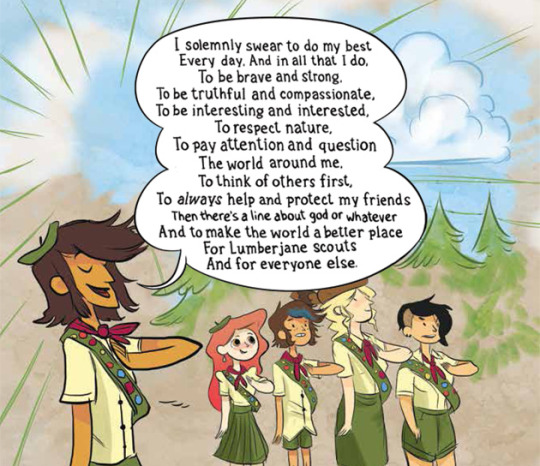
Stop. Go back. Read the pledge again line by line ... Right?! Now THAT is a pledge! True Lumberjanes (and true feminists) are not just fighting for each other, but “for Lumberjane scouts and everyone else.” This is not a club just for girls, they are in it for the whole world. Eat that meninists! You sons of blast-ended skrewts!
(All photos came from autostraddle.com. Thank you very much!)
10 notes
·
View notes
Text
The Hurley Factor: Survival vs. Living in the Walking Dead
In the last three weeks I’ve feverishly consumed all five seasons of The Walking Dead. And before you start making any sarcastic comments about how a show about zombies has turned me into a zombie, that’s only like 2.5 hours a day. Which is a completely reasonable amount of television to consume, right? Well within range of society’s recommended daily fictional intake.
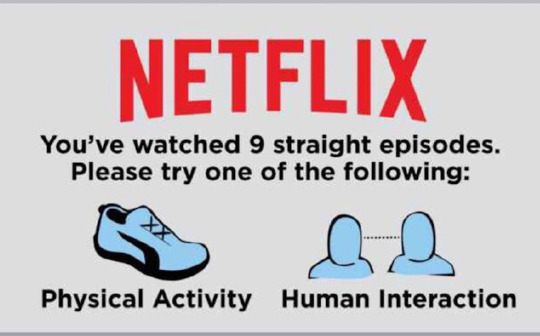
As I watched it I started considering what role I would play in a group of zombie apocalypse survivors. Leaders, doctors, hunters, soldiers, and farmers were all hot commodities. What skills I could offer up that would A. make me a desirable asset to the group and B. help me not get eviscerated and have my entrails snacked on by zombies? It was not an inspiring list. It probably comes as a big shock but I can’t see a geeky English major who avoids conflict and leads a sedentary life of optimism lasting too long in an apocalypse of any kind.
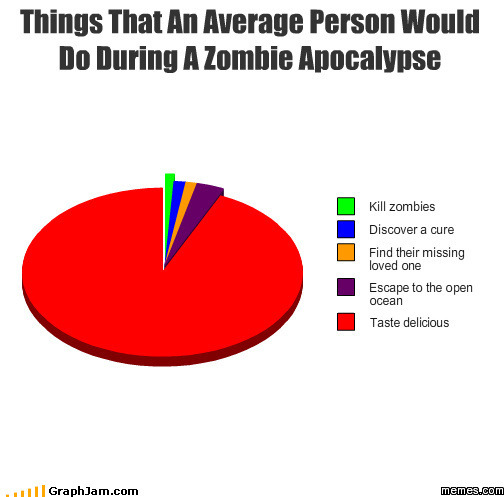
But as I continued to watch the series I slowly came to the realization that something was missing from their group, something critical that gave me hope that there is a hypothetical part for me to play.
To articulate exactly what The Walking Dead is missing I’m going to need to throwback to LOST (which must always be capitalized. If you don’t use all caps you’re spelling it wrong). The show of shows. The series that, in my humble opinion, was instrumental in fostering in the Golden Age of Television in which we are now living (admittedly, Netflix may have also had something to do with it). LOST shares many similarities with The Walking Dead. Both consist of an ensemble cast of characters who have been taken from the world they know and must work together to find a way to survive in a harsh, new environment.
While LOST may not have millions of the undead desperate to sink their teeth into its characters’ flesh, that polar bear was pretty scary. Both shows put me through the emotional ringer. I ahhed, awwwed, AHHH!-ed, ah ha!-ed and even made sounds that didn’t start with ‘A.’ But LOST managed to do something that The Walking Dead just can’t seem to hack. It made me laugh. Now I know what you’re likely thinking: rotting bodies ripping the flesh off terrified humans and having said zombies heads bashed in by bats, machetes, knives, walls, and between car doors, doesn’t exactly inspire a giggle fit. Whoever coined the phrase “side-splitting” probably wouldn’t have associated it with laughter if (s)he had ever seen someone’s sides literally split open.

But allow me to present what I am calling, the Hurley Factor. Hurley provides proof that just because life is super gross and more than a little dangerous, and that no one gets to go to the movies, eat a cheeseburger, or change their underwear regularly, doesn’t mean it can’t have humor. Hurley understood that simple survival doesn’t cut it, that Maslow’s Hierarchy of Needs is full of crap (no offense, Abraham Maslow, I’m sure you were a very smart, empathetic guy and from your picture on Wikipedia you seem really nice).

In episode 109, when everyone criticized Hurley for wasting his time making a golf course he replied,

And it turns out he was right. While Jack was “going crazy trying to make everyone feel safe…[Hurley] builds a golf course and everyone feels safe.” Living and surviving are not the same thing and without the ability to live, survival loses its worth.
Now I will be the first to admit that Hurley has even less of a chance of surviving the zombie apocalypse than I do, as he himself told Charlie when discussing the zombie potential of the recently dead Ethan: “Dude, I know how this works. This is going to end with you and me running through the jungle… screaming, crying… he catches me first because I’m heavy and I get cramps” (episode 116). But the group needs someone who appreciates the importance of enjoying life whenever possible, of making time between stabbing zombies in the face and running for their lives from cannibals and I-keep-zombie-heads-in-tanks-because-goldfish-are-for-sissies Governors to give their survival meaning.
This concept is somewhat lost (heehee...lost) on the characters of The Walking Dead. By the fifth season, it feels like they continue to survive solely out of habit. Rick essentially tells them to abandon all thought of living entirely and just focus on survival. He tells the group “We do what we need do and then we get to live...Because this is how we survive. We tell ourselves that we are the walking dead” (episode 510). He believes that if they put all thoughts of living on hold, and just get through the nightmare, eventually they’ll reach a time and a place where they’ll get to live and be human again. Rick ascribes to the same philosophy that Jack did: that they can’t live until they feel safe and secure in their survival when it actually works the other way around. They will never feel safe until they allow themselves to start living regardless of the dangerous, hopeless circumstances in which they find themselves.
This becomes clear when they come to Alexandria. Finally, a place where people are able to live again. They have dinner parties and homework and chocolate chip cookies; they shower regularly. Now they can relax, feel safe, and make some jokes, right? Wrong. They’ve forgotten how to live normal lives, they turn their noses up at normal, calling it naive. Daryl joins Aaron on the outside, stating that he’s more comfortable killing walkers. Sasha also leaves, Glenn goes on runs, and Rick and Carol prepare for a hostile takeover. It is exactly as Hurley said: even though they should feel safe and finally let themselves relax, they can’t. Instead, they go crazy just “waiting for the next bad thing to happen.” It turns out that the characters of The Walking Dead don’t need food, or thick walls, or an endless supply of bullets, or even a shower, they need a Hurley.
So that would be my role in a zombie survival group: I would attempt to provide the reason for living. With birthday parties and games and book clubs and whatever else I could think of. And, not to brag, but it’s secretly the most important job ever because without someone to give some immediate meaning to life, all the other jobs are sort of obsolete. And it doesn’t take much to add some humor. A single “duuude” will do the trick.
So if you ever find yourself facing an apocalypse or stuck on an island, take a lesson from Hurley and just do a cannonball, it’s more important than you think.

0 notes
Text
The Importance of Being Sad: Feeling the Feels in Pixar’s Inside Out
So today's entry is going to be more thoughtsy and less essay-y. Not that I won't make a claim and argue it. Because I totally will (sidenote: did anybody catch the Oscar Wilde reference in the title? Because I thought really hard for it).
When it comes to fiction making you think some deep, metaphysical thoughts, it doesn’t get much more meta than Pixar’s latest film. Move aside Inception, Inside Out is the new mind-bending, reality-screwing film to watch! I mean, abstract ideas like sadness and joy become the literal personified beings Sadness and Joy, that at one point are deconstructed into abstract thoughts! And then the city folds on top of itself, the gravity goes away, and the camera zooms into Joy’s brain to show her five emotions at her control panel as the Twilight Zone theme song echos into the night (Clarity note: that doesn’t actually happen). And yet, somehow the film manages to convey complex and abstract concepts about the tumultuous world of an 11-year old’s mind in a clear, easy to digest way. Chief among those concepts is the purpose and benefit of each of the five personified emotions in Riley’s HQ.

Fear keeps her safe from doing dangerous, potentially deadly things; Disgust keeps Riley from making mistakes and helps her avoid potentially disastrous pitfalls, from poison to embarrassment; Anger gets things done and makes sure she doesn’t have to suffer unduly or put up with any garbage; Joy’s purpose is kind of obvious: she makes Riley happy. And in Riley’s brain, Joy is very clearly the one in charge. She lets certain emotions take over should the need arise, but she is quick to jump in and take over again before things start to spiral. What’s most interesting is that the other emotions all agree that she should be in charge. They want Riley to be happy and to have a life primarily filled with joy. Which is why Sadness is such a teardrop-shaped puzzle to them all. It becomes clear from the beginning of the movie that none of the emotions know what to do with Sadness, including Sadness herself. What possible purpose could feeling sad serve? Answering this question becomes the underlying purpose of the entire film. The film comes to the conclusion that the expression of sadness acts as an emotional bridge between people (or cotton-candy-cat-elephant-dolphin hybrids, whose stories have a level of tragedy that should not be allowed in characters who are primarily confectionery) allowing them to empathize with one another and through that empathy, find joy (joy the feeling not Joy the personified emotion. Capitalization is REALLY important in this post).
That was the message I received: sadness = empathy. Which is an interpretation I had never considered before. It's really beautiful if you think about it: that humans use their own sadness to relate to the sadness of others. It's like that quote from John Green’s Paper Towns, "we see out of ourselves through our cracks and into others through theirs" (please leave your buttcrack jokes at the door, I'm trying to convey a metaphor here). And furthermore, not only can people use their own pain to recognize the pain of others, it compels them to help alleviate it in others as well.
But as beautiful as that concept is, it's dangerous to embrace sadness with reckless abandon. In many ways Sadness is a self-centered emotion if left to her/its own devices. Joy is all about the big picture, making the best of things, and I like making lists of three. But Sadness is highly susceptible to wallowing:

“Crying helps me slow down and obsess over the weight of life's problems.”
If left on her own, Sadness is unable to facilitate change or action. Joy was literally weighed down by Sadness who refused to move because she was “too depressed to walk.” To extend the metaphor, if a person is too focused on their own misery they might be tempted to offer their foot to be dragged around, rather than a hand to be pulled up. Sadness, like all the other emotions, only has value when she works in conjunction with the other emotions. She needs Joy pulling her out of her wallow of misery and Joy needs Sadness to find the true happiness that only comes from acknowledging and expressing disappointments instead of burying them in a shallow grave and pretending they don’t exist.
So perhaps Inside Out is less about discovering the purpose of each emotion, and more of an exploration of the evolving complexity of emotions as a child grows up. When Joy first winked into existence Riley’s control panel consisted of only one button, one fleeting emotion in its most simple form. As she grew up her panel was upgraded to a whole host of keys and levers. Because as a person matures, the world they see and the relationships they develop become complex and messy and contradictory. Unless you're Ron Weasley and only have the emotional capacity of a teaspoon, it becomes possible to feel more than one emotion at the same time without exploding. This is why songs like “Hurts So Good” exist. The world of adulthood is riddled with experiences where you feel two seemingly conflicting emotions at once: Maybe it’s watching a Game of Thrones finale, going to Comic Con, eating McDonald’s, or watching anything on Bravo. In the deep philosophical words of Ron Weasley:

But such complexity isn’t really possible until that dreaded puberty button is pushed and you become a hormone-addled teenager (Oh my goodness, what on earth would hormones look like in the world of Inside Out?! That needs to be a thing. I’m not saying sequel but at least a short. Inside Out Episode II: The Hormones Awaken). As such, Inside Out showcases the pain and difficulty of the transition to a more complicated range of emotions and shows that all of the emotions must work together, and even at times be felt together. When Riley finally shares her feelings with her parents in that wonderful, tear-infested moment at the end of the film, the core memory created is both blue and yellow, sad and joyful. Such complexity becomes necessary as a person matures and begins to both absorb and observe more of the beautifully unfathomable universe.
Even this part of the universe:
youtube
1 note
·
View note
Text
Why in the Name of Merlin’s Pants Do We Watch Rape Scenes? Seriously, Let’s Put on Our Literary Analysis Caps and Figure out Why
Here we go. First entry. I know that everyone and their grandmother has put in their two cents about this topic, but it sort of inspired this whole thing so I have to start with it. Citation sidenote: I got pretty much all of the photos from Pinterest and can’t figure out how to find the original source. So if I used your photo, thank you!
Warning: Here be Spoilers for Outlander and Game of Thrones!
First a little background. Outlander began as my secret shame, a guilty pleasure from a girl who has historically held a proud disdain of the romance genre. I should have found Outlander ridiculous, with its breathless, orgasmic sex scenes and Jamie, the beautiful Scotsman who embodies the perfect blend of strong and sensitive. But I got sucked in by the time travel and the foul-mouthed feminist protagonist. Did I know that Jamie Fraser was the ultimate female fantasy that could never actually exist? Yes. But did the show also subvert gender roles and dichotimize marital relationships across decades and cultures? Yes.
In short, viewers come for the sexy times (pun unintended but too perfect to exclude)
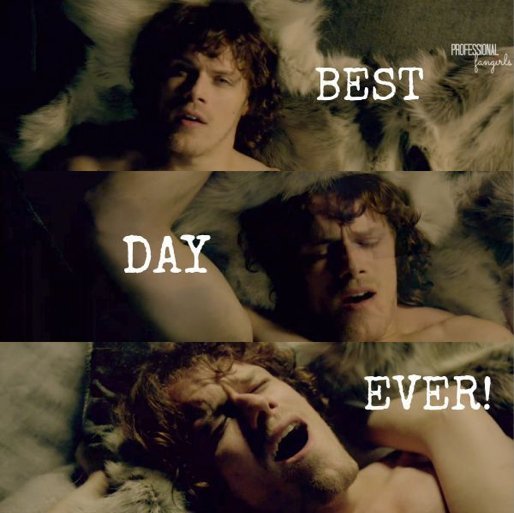
but stay for the feminism:
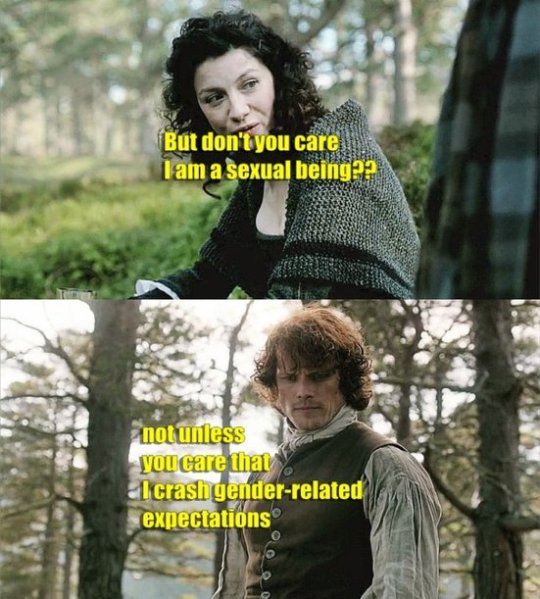
Then the fifteenth episode happened. That impossible female fantasy became a victim of torture and sexual assault at the hands of the sadistic Jack Randall. It was long, brutal, and graphic and stuck with me in a way that no scene before ever has. I spent the day following in a metaphorical fog, replaying the scenes over and over again, unable to escape. Perhaps this scene affected me so strongly because I watched it on the back of yet another sadistic rape scene from Game of Thrones.

The biggest question I had was why in the name of Merlin’s pants did I choose to put myself through that? Why do viewers feel compelled to watch the ugliest aspect of humanity played out in graphic detail? Why would the creators feel compelled to make it? To work through these questions, I decided to implement the English major’s therapy: write an essay. In it I determined that scenes of sexual violence are necessary to realistically represent the worlds in which the shows are set and that a graphic portrayal allows the audience to emotionally connect with the character in order to leave a deeper impact. But that only works if the show also commits to an accurate depiction of the long-lasting effects of sexual violence.
For better or worse, the creators of both shows have created a world where violence is, pardon the pretentious expression, de rigueur and the land is ruled by men; women are merely commodities to get those men what they want. Viserys seems to sum up the tone of the times rather well with this charming moment:
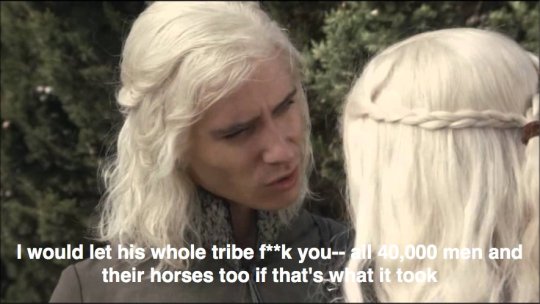
Ramsay’s rape of Sansa on their wedding night seems inevitable when you add in the fact that Ramsay is a flesh sack of human garbage who uses sex as a tool for cruelty (evidenced by when he tortured, mutilated, and broke Theon) and that Sansa has been a victim and plaything for ambitious minds that delight in the cruel pretty much since the show’s inception. But therein lies the problem: Sansa has always been a victim. Since the moment her father lost his head, Sansa’s victimization has been the underlying, definitive element of her character. While recent episodes suggest that Sansa has finally gained some self-reliance, the fact that any significant development happens after Ramsay raped her does seem to endorse the idea that rape is used, in the words of reviewer Alicia Lutes, “as if it is the only thing that truly brings growth to female characters.”
Enter Outlander. Can’t accuse that show of using rape as the be-all and end-all device for female character development because Jamie is a man. But gender is merely the most obvious difference between Sansa and Jamie. Just like Sansa, Jamie’s characterization up to this point plays a massive part in the effect his assault has on viewers. While Sansa has played the role of a victim, until now Jamie has always played the part of dashing rescuer. But when Randall, Outlander’s resident flesh sack of human garbage, gets ahold of Claire for the third time, the only way Jamie can rescue her is to take her place as Randall’s victim. The change in Jamie’s role gives the scene a deeper emotional impact because it deviates so far from viewers' expectations and involves such a devastating fall from
classic hero:

to broken victim:

This is not what is supposed to happen to James Alexander Malcolm MacKenzie Fraser.
In the end, emotional impact is really what it’s all about. Yes realism is important, but only because it helps viewers immerse themselves in the experience of the characters if they’re not constantly being distracted by anachronisms and and outlandish (pun absolutely intended) plot twists. But fiction, be it novels, film, or television, does not simply mirror reality, that’s a job for documentaries...or a mirror. As science fiction/fantasy author Ken Liu argued, “fiction persuades through experience.” It creates an emotional connection between its characters and the audience by letting them crawl inside characters’ heads and experience life with them. Therefore, it stands to reason that the more detailed, visceral, and explicit a show, the deeper its emotional effect. Outlander goes right to the edge of the cliff with that idea.
Standing in stark contrast to the comparatively mild, ten-minute scene represented in Game of Thrones, Outlander’s graphic depiction of sexual violence spans two episodes and shows every pain, humiliation, and intimate violation to which Randall subjected Jamie in highly explicit detail. But interwoven throughout all of the scenes of torture, is the emotional and psychological struggle Jamie faces after his escape. Game of Thrones moves on quickly and I get why. The show has approximately 84,000 characters each with their own plot line, so giving Sansa the amount of screen time necessary to truly show the full emotional and psychological effects of sexual violence is a tall order, but it's an order Outlander delivered. The action of the show was put on hold in order to detail the pain and anguish of the event itself, the shame and despair that immediately followed, as well as the catharsis as Jamie began to heal. If a show is determined to use acts of sexual violence within their narrative, as they should be, they need to commit to telling the whole story.
Through all of the discussion of why shows choose to include graphic content, particularly sexual violence, we have yet to explore the question that plagued me and inspired this analytical quest: Why do I and thousands of other viewers choose to subject ourselves to be vicariously raped via television? here’s my answer: viewers use fiction to confirm their beliefs that violence and rape and evil exist. Through the character’s perspective viewers even get to understand how it feels to confront it. But fiction has the very, very, significant bonus of not being real. No one actually gets hurt. The fictional characters can be used as whipping boys to take on all the physical pain, torture, even death and leave only the emotions for the audience to feel. In the end, audiences get to feel the relief and satisfaction of surviving such an experience; to know that they can face the darkest parts of humanity and come out the other side, even if the characters themselves do not.
2 notes
·
View notes
Text
About a Blog, Specifically This One
As the proud owner of a degree in Literary Studies, the way I judge the worthiness of a piece of fiction, be it a novel, television, or film, is if I could write a decent essay about it. Which may sound like I've limited myself to Nobel Laureates, Citizen Kane, and no television at all. But my gaze has been so corrupted by literary thinking that I can find depth and social commentary in just about anything, whether the depth was intended or not. And when it comes to books, TV shows, and movies I am like competitive eater Takeru Kobayashi but instead of hot dogs, it's massive amounts of fiction that I consume (did I just look up the name of the hotdog eating contest record-holder? Of course I did). When you add these two veritable super powers together it comes as no surprise that a blog such as this would step into the sun. In it I will try to give what I read and watch my own analytical, meaningful spin; just because something is entertaining doesn't mean it can't be thought-provoking.
So while my expectations of anyone actually reading my thoughts on fiction are fairly low, I am startlingly okay with that. Writing informal essays on the fandoms I care about is simultaneously one of my favorite hobbies, the way I work through my feelings about a particular subject and a particular work, and how I remember said feelings. So it’s time to get ready to delve deep into the bottomless world of fiction and think some thoughts!
0 notes